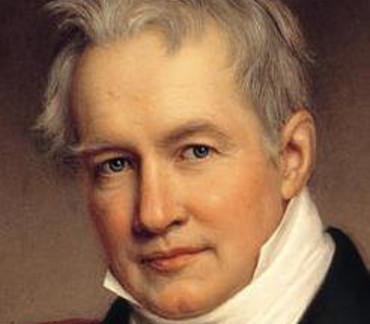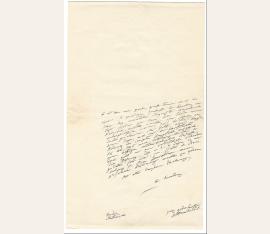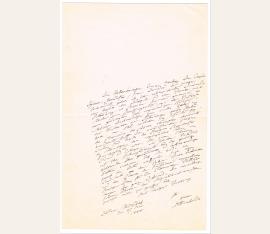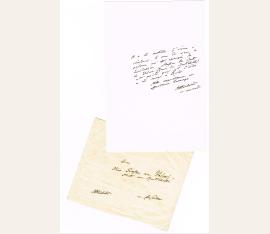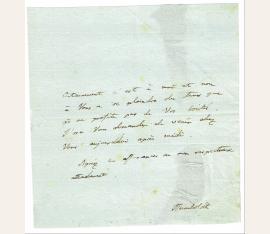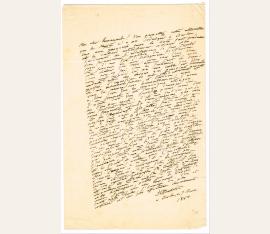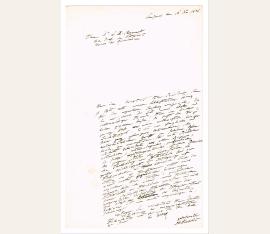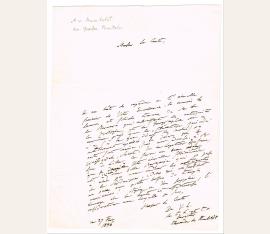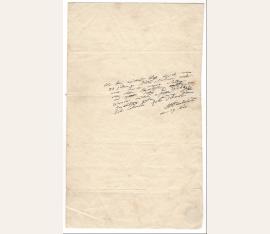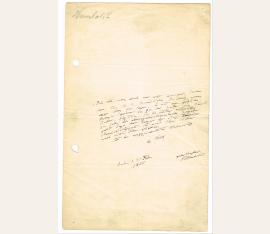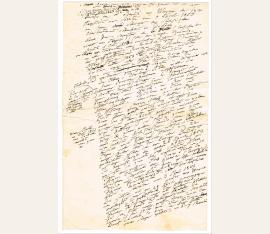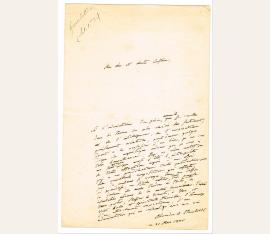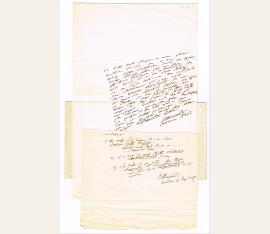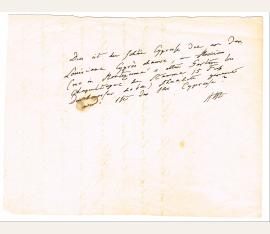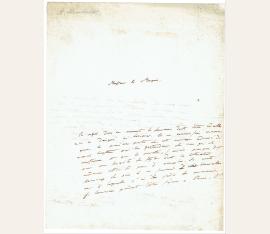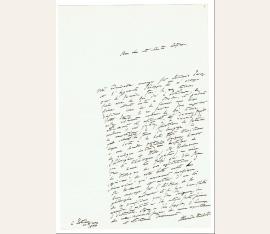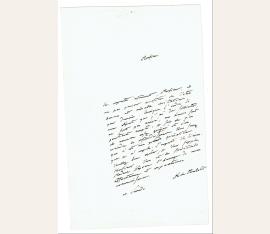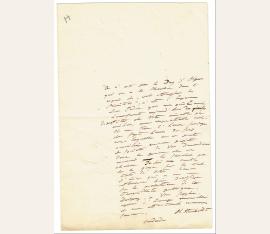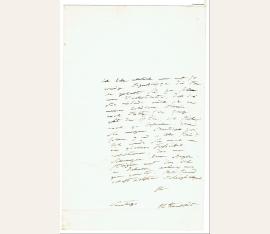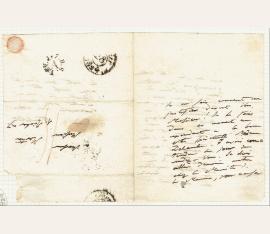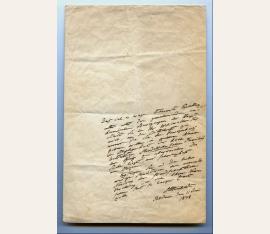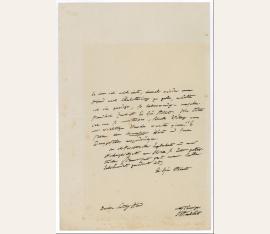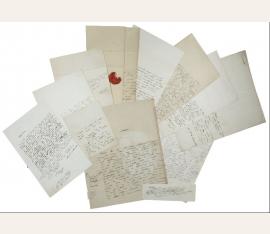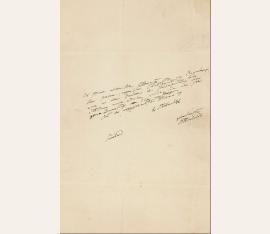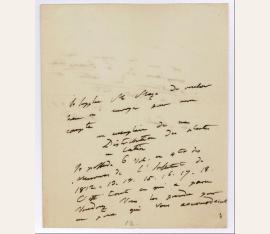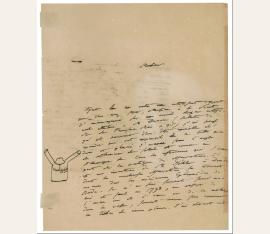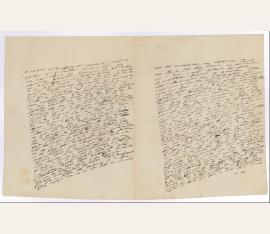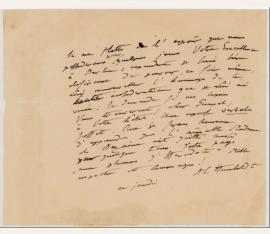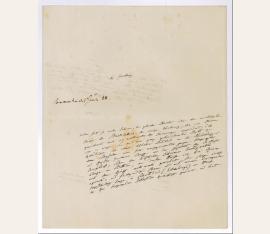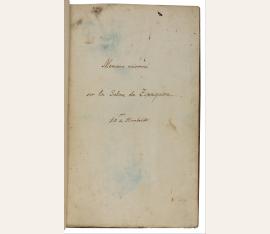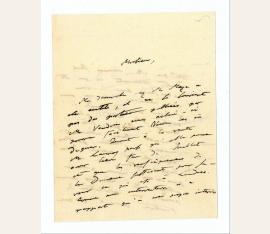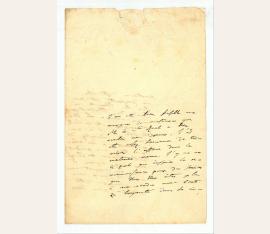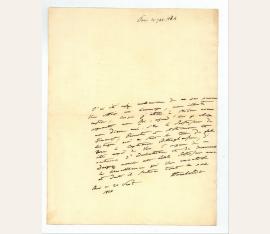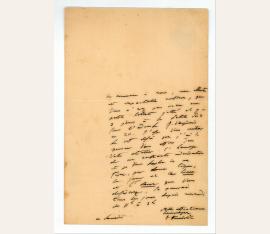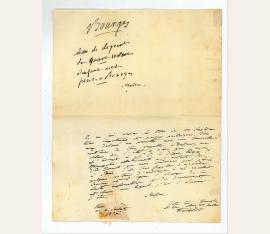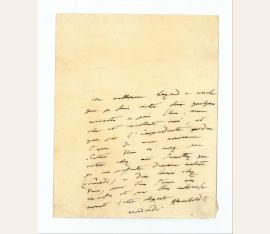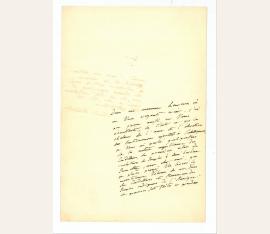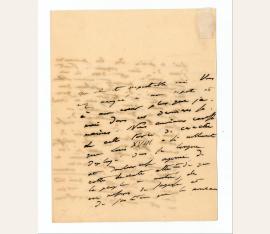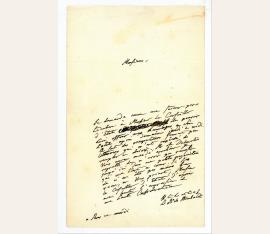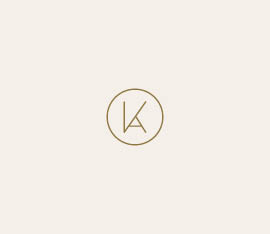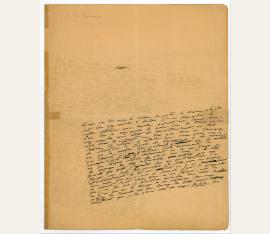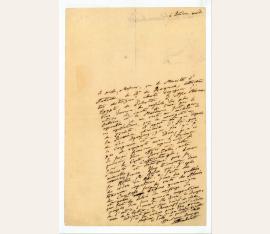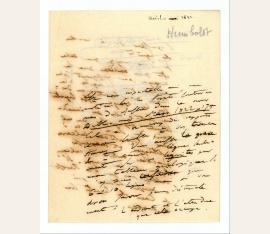Naturforscher und Geograph (1769–1859). Eigenh. Brief mit U. („AVHumboldt“). O. O. u. D. ½ S. Kl.-4to.
$ 2,128 / 2.000 €
(24113)
An einen Gelehrten, der sich um eine Stelle in Dorpat bemüht hatte: „Ich weiß nicht ob diese Zeilen Ew Wohlg[eboren] noch hier treffen: ich habe eine leider! abschlägige aber sehr höfliche Antwort aus Petersburg in Hinsicht der Stelle in Dorpat. Sie ist von Graf Stroganoff. Ich kann Sie Ihnen zeigen, wenn Sie mich etwa Freitag morgen 9–10h mit Ihrem Besuche erfreuen wollen. Religiöse Intoleranz hindert alles. Es ist nicht bequem, unter den Christen zu leben [...]“. – Papierbedingt etwas gebräunt und mit kleinen Einrissen in den Faltungen; das obere (unbeschriebene) Viertel abgetrennt und lose beiliegend.
Naturforscher und Geograph (1769–1859). Eigenhändiges Manuskript. O. O. u. D. 1 S. Kl.-8vo.
$ 851 / 800 €
(24844)
Humboldt-Notiz um Vulkankrater in Deutschland (Eifel), mit folgenden vorkommenden Ortsnamen: Roddenberg, Mosenberg, Geroldstein, etc … „Maar“ (Humboldt, Steininger) - trichterförmige Vulkane in Vulkanfeldern Vermutlich handelt es sich um eine Literaturrecherche (vielleicht aus Humboldts eigener Literatur) zu sein: „1) […] Gneis p. 302 2)Eiffel u. Maare u. Vulkan u. der […] p. 277 Im Norden des Gross-Mosenberges p. 278 3)Lava[…] weder in Mosen- bergk, noch in Gerolstein 5 noch […] […] Roddenbergk / da Eifel nicht bei ihrem Urspr.
sn. […] Gebergert [?] sucht es […] hell [..] […] hell gebrannte davor Schegersberg p. 276 […] Tradiert Messen [?] zw Refelltbergs [?] […] …. an Otestbg [?] […] 280 4)Feripe [?] 1276_28c“.
Naturforscher und Geograph (1769–1859). Eigenh. Brief mit U. Berlin. ½ S. auf Doppelblatt. Gr.-8vo. Mit eh. Umschlag mit großem roten Lacksiegel.
$ 2,394 / 2.250 €
(25348)
An den Freiherrn Julius von Hügel (geb. 1810), Erster Stallmeister und Kammerherr S. M. des Königs von Württemberg. Er war der Sohn aus der 2. Ehe des württ. Generals und Staatsministers Ernst Eugen von Hügel (1774-1849) mit Louise Ernestine, geb. Freiin von Gemmingen-Guttenberg (? 1834). 1852 löste Julius von Hügel den Freiherrn Philipp von Gemmingen als Leiter des kgl. württ. Gestüts Weil ab. Dies Gestüt (1810-1932) war das erste, dass außerhalb des Orients eine Reinzucht mit Arabern betrieb.
Hügel wurde vom König nach Ägypten geschickt, um dort persönlich Pferde für die Zucht einzukaufen. "Es ist mir eine grosse, grosse Freude durch die eignene, so gnädige Zuschrift Ew. Excellenz von Ihrer lang erwarteten Ankunft benachrichtigt worden zu sein. Die Glieder meiner Familie, welche nächst mir Ihnen am anhänglichsten waren, sind leider! längst dahin geschieden. Mir selbst bleibt in diesen Tagen auch nur der schriftliche Ausdruck des innigsten Dankgefühls möglich. Ich bin fast noch bettlegrig, leidend an einem heftigen catharrhatischen Anfalle, doch giebt mir unser vortreflicher Schönlein die Hofnung, dass in 3-4 Tagen es mir gestattet sein wird, im Hotel de Brandenbourg der Frau Generalinn meine persönliche Aufwartung machen zu können ..." - Johann Lukas Schönlein (1793-1864), war Humboldts Arzt und betreute als Leibarzt auch Friedrich Wilhelm IV. von Preußen. Hügel veröffentlichte 1861 das Buch über "Die Gestüte und Meiereien Seiner Majestät des Königs Wilhelm von Württemberg" in Stuttgart..
Naturforscher und Geograph (1769–1859). Eigenh. Brief mit U. Paris, "a l'Observatoire la nuit a 1 h". 1 S. auf Doppelblatt. 8vo. Mit Adresse.
$ 2,128 / 2.000 €
(25593)
An Marguerite-Madeleine Gautier (1767-1838), Schwester des Bankiers, Mäzens und bedeutenden Botanikers Benjamin Delessert (1773-1847), eine Einladung betreffend: "Je me suis presente ce soir chez Vous, Madame, pour Vous offrir l'hommage de mon reconnaissance et pour Vous temoigner de bouche combien je suis sensible aux marques de Votre bienveillance. Je profiterai certainement de Votre aimable invitation pour Samedi et je serai doublement satisfait si je puis partager ce plaisir avec mon ami Bonpland [...]" - Gut erhalten.
Naturforscher und Geograph (1769–1859).
Eigenh. Brief m. U. Donnerstag („à l’École Polytechnique jeudi matin“). 4to. 1 p. Mit Adresse (leichte Stockflecken).
$ 1,915 / 1.800 €
(25832)
An M. de Zapfel, Adjutant des Kriegsministers. Humboldt setzt sich für junge Leute ein, die Fasching gefeiert haben und für die er um Gnade bittet: „qui ont dansé le mardi gras […] [grâce] pour deux jeunes gens qu’une étourderie peut jetter dans le plus grand embarras. Le Ministre m’ayant promis leur pardon. Ils ont expiés leur faute par trois semaines d’arrêts“.
Naturforscher und Geograph (1769–1859). Autograph lettercard signed („Humboldt“). [Paris]. 1 S. 12mo. Mit Siegelspur und Adresse.
$ 1,596 / 1.500 €
(26194)
To his Parisian editor (Antoine Augustin) Renouard, on the first volume of the „nouvelle ed[ition]“ of his „Essai politique sur le royaume de la Nouvelle Espagne“, which was to be published by Renouard from 1825 to 1927: „Je supplie Monsieur Renouard de vouloir bien me faire savoir si le 1er volume de ma nouvelle ed. du Mexique a deja ete mis en vente. C’est une simple curiosité d’auteur: on vient de me dire qu’il y a meme deja une annonce dans le Journal de Paris [...]“. – Slightly spotty.
Naturforscher und Geograph (1769–1859). Autograph lettercard signed („Humboldt“). [Paris]. 2/3 S. 12mo. Mit Siegelrest und Adresse.
$ 1,915 / 1.800 €
(26195)
To the French mathematician Jean Marie Constant Duhamel (1797–1872), on postponing a meeting: „La journée d’aujourd’hui est si peu tranquille que j’ose prier Monsieur Duhamel de me reserver l’amitié de les aimables conseils pour Samedi [...]“. – Since autumn 1825, Humboldt took private lessons in Mathematical physics with Duhamel for almost 16 months. – Slightly browned.
Naturforscher und Geograph (1769–1859). Autograph letter signed. „Potsdam, Stadtschloß“. 1 S. Gr.-8vo.
$ 3,723 / 3.500 €
(26198)
A letter of recommendation to the unnamed Russian Latvian chemist and physicist Adolph Theodor Kupffer, who had founded the Depot of Standard Weights and Measures, and the main physical Observatory in Russia; recommending Carlos Aguirre y Montúfar and his brother [Juan].
Naturforscher und Geograph (1769–1859). Eigenh. Brief mit U. ("AVHumboldt"). Potsdam. ¾ S. Gr.-8vo.
$ 3,723 / 3.500 €
(35061)
An den von ihm geförderten Landschaftsmaler Albert Berg (1825–1884): „Ich erhalte heute morgen (25 Juni) Ihren Brief vom 24sten, theurer Berg! Es ist eine physische Unmöglichkeit dass der König vor seiner Abreise, die in vier Tagen ist, Ihr Bild sehen könnte, nicht bloss wegen des kurzen Zeitraumes (in den noch ein Sontag fällt) sondern weil er ganz, seit gestern, mit dem Krpr. von Sachsen [d. i. Kronprinz Albert, 1828–1902, König von Sachsen 1873–1902] und dessen Gemahlin [d. i. Carola von Sachsen, geb.
Prinzessin von Wasa-Holstein-Gottorp, 1833–1907, ab 1853 mit dem Kronprinzen verheiratet] bes[ch]äftigt ist. Der König kommt erst Ende Juli von Marienbad zurück, wo dann die Kaiserin [d. i. Alexandra Feodorowna, geb. Prinzessin Charlotte von Preußen, 1878–1860, Tochter von Friedrich Wilhelm III . u. Luise von Preußen, ab 1817 mit Kaiser Nikolaus I. von Rußland verheiratet] auch wieder in Sanssouci erwartet wird. Der Grossherzog von Schwerin [d. i. Friedrich Franz II . von Mecklenburg-Schwerin] äussert viel Freude Sie eine Zeitlang in seinem Lande zu besitzen. Ich selbst werde wohl erst in 8 Tagen nach Berlin kommen [...]“. – Alt auf Trägerpapier montiert..
naturalist, geographer, ethnographer and scientific traveller (1769-1859). Autograph letter signed („AVHumboldt“). N. p. o. d. 8vo. ½ p. With autogr. envelope.
$ 1,968 / 1.850 €
(35082)
To Count Valori, Prince Rustichelli (i. e. Henri Valori-Rustichelli, 1834–1898), transmitting him an invitation (to Sanssouci?): „Il a été inutile d’écrire à Sanssouci. Je viens de voir la personne qui est chargé des Invitations. Monsieur le Comte de Valori (Prince de Rustichelli) est invité pour 3h. L’ordre a été envoyé à Berlin. Mille respectueux et affectueux hommages“.
German naturalist and explorer (1769-1859). Autograph letter signed („Humboldt“). N. p. o. d. 4to. 1 p.
$ 1,011 / 950 €
(35089)
To an unnamed addressee, fixing a new appointment: „Certainement c’est à moi et non à Vous à se plaindre […] que je ne profite pas de Vos bontés. J’ose Vous demander de venir chez Vous aujourd’hui après midi. Agréez les assurances de mon respectueux attachement“. – Somewhat spotty.
Naturforscher und Geograph (1769–1859). Eigenh. Brief mit Unterschrift. Berlin. 8vo. 1 page.
$ 2,660 / 2.500 €
(44904)
An Emmanuel Arago: „Mon cher Emmanuel […] vous vous êtes souvenu de moi mon cher ami avec cette chaleur que nous aimons tant chez vous. Vous avez eu foi dans les sentiments que vous nous avez inspirés […] J’aime à vous dire que les impudiques attaques d’un journal n’ont jamais diminué ici l’estime dont vous jouissez parmi nous dans un temps bien agité. Votre père vous parlera de mes chagrins à l’occasion […] Je suis soulagé et heureux par l’espoir que ce monde s ‘améliore […]“
Naturforscher und Geograph (1769-1859). Eigenh. Brief mit U. Potsdam, „Sanssouci“. 1 S. Gr.-8vo.
$ 3,723 / 3.500 €
(46995)
An den Apotheker und chemischen Fabrikanten Ludwig Clamor Marquart (1804–1881), den Vizepräsidenten des Naturhistorischen Vereins der Rheinlande: „Wenn ich, Verehrtester Herr Präsident, Ihnen so spät erst meinen lebhaftesten Dank für das angenehme Geschenk ausspreche, das Sie mir durch die Güte meines edeln und liebenswürdigen Freundes, Herrn von Dechen, haben zukommen lassen, so liegt die Verzögerung bloss in meiner vielbewegten hiesigen Geschäftigkeit. Es ist ein glückliches und schon ganz gelungenes Unternehmen, die naturhistorischen Kräfte vom schönen Rheinlande zu concentriren.
Ihr erstes Bändchen enthält Interessantes aus allen Regionen, botanisches, entomologisches, geognostisches ja selbst krystallographisches. Dechens Beweise des jüngeren Alters der Lavaströme der Thalbildung im Nettethal sind von grosser Wichtigkeit. Die Auflagerung auf Flussgeschieben ist besonders lehrreich. Auch der Aufsaz des H Foerstemann musste mich wegen uralter jugendlicher Erinnerungen anziehen. Herrn Wirtgen’s persönlichen Umganges habe ich während meines fröhlichen Aufenthaltes in Horchheim genossen und mich seiner physikalischen Ansichten über die geographische Verbreitung der Pflanzen erfreut. Das plözliche Auftreten der Cuscuta hassiaca ist eine recht merkwürdige Erscheinung [...]“. – Humboldt hatte am 12. August an der Einweihung des Beethoven-Denkmals in Bonn teilgenommen; gewohnt hatte er damals bei Joseph Mendelssohn in Horchheim. – Beiliegend ein eigenh. adressierter Briefumschlag Humboldts an „Herrn Professor Dr Nees von Esenbeck“ in Bonn (Poststempel: Berlin 28.VI. o. J.) sowie sein Portrait (ca. 97:76 mm; „Krüger gez.“, „M Hofmann u. Fr. Stöber gest. in Stahl“). - Leicht gebräunt..
Naturforscher und Geograph (1769-1859). Eigenh. Brief mit U. („Alexandre de Humboldt“). O. O. 1 S. Kl.-4to.
$ 1,915 / 1.800 €
(46996)
An [Albert Graf von Pourtalès] wegen eines Werkes des Generals und Naturforschers Alberto Graf von La Marmora, das Humboldt erhalten sollte: „Monsieur le Comte, | Je me hâte de repondre à l’aimable souvenir de Votre Excellence. Je connois les beaux et solides travaux de Mr de la Marmora qui embrassent les antiquités de la Zoologie, et la Geographie de ce curieux pays que le ‘flüchtige Reisende’ n’a [...] pas entierement epuisés. Je desire que la carte soit remise, sous mon adresse, à Mr Weißkirch, Secret.
de la Legation Prussienne, Rue de Lille. Ce sera un beau cadeau que je devrai à Votre aimable sollicitude et à celle d’une belle Marquise qui je pense n’aime pas avec ardeur les antiquités de la Sardaignes, idoles qui ressemblent un peu aux petites bosses des temples mexicains! [...]“. - La Marmora hatte im Vorjahr eine topographische Karte Sardiniens veröffentlicht. - Leicht gebräunt, Oberrand leicht beschnitten..
Naturforscher und Geograph (1769-1859). Eigenh. Brief mit U. O. O. ¼ S. Gr.-8vo. Mit Siegelspur und signierter Adresse.
$ 1,277 / 1.200 €
(46997)
An Marie Schrader in Potsdam, „Leipzigerstraße 87, a“: „Ich bin nicht bloss durch mein 83jähriges Alter, sondern mehr noch durch meine Stellung von allen Geschäften entfernt, und kann daher Ew Wohlgeb Wunsch nicht erfüllen. Alle Geschäfte gehen durch Herrn Geh. Cabinetts Rath Illaire“. - Ernst Emil Illaire (1797-1866) war seit 1844 Geheimer Kabinettsrat von König Friedrich Wilhelm IV. - Etwas braunfleckig und knittrig, rechter Rand leicht beschnitten.
Naturforscher und Geograph (1769-1859). Eigenh. Brief mit U. Berlin. ¾ S. Gr.-8vo.
$ 2,979 / 2.800 €
(46998)
An [Adolf Henze], dem er für ein Werk dankt, wohl „Die Handschriften der deutschen Dichter und Dichterinnen“ (Leipzig 1855): „Ich eile, wenn auch nur mit wenigen Zeilen Ihnen für Ihr so freundliches Geschenk meinen innigen Dank zu sagen. Es ist ein glüklicher Gedanke gewesen bis zu den Zeiten von Kleist Haller, Klopstock, ja bis Luther aufgestiegen zu sein. Die chirogrammatomantische Zugabe giebt dazu dem Ganzen den Reiz einiger Mannichfaltigkeit. Sie wird Ihrer Natur nach nicht Allen gefallen [...]“.
- Henze machte sich damals einen Namen als Erneuerer der Chirogrammatomantie (Graphologie). - Etwas gebräunt und fleckig, gelocht, kleine Randschäden, Faltenrisse (teilweise hinterlegt)..
Naturforscher, Weltreisender (1769-1859). Eigenh. Manuskript. O. O. [nach 1852]. 1 1/2 SS. eng beschrieben. Gr. 8vo.
$ 6,915 / 6.500 €
(47048)
Vielfach verbessertes Manuskript zu einer Abhandlung über die zweite große Afrika-Expedition von Heinrich Barth (1849-1855), wobei Humboldt großenteils aus Briefen von Barth zitiert.
Naturforscher, Weltreisender (1769-1859). Eigenh. Brief m. U. "Alexandre de Humboldt". O. O. 1 S. Gr. 8vo. In franz. Sprache.
$ 2,660 / 2.500 €
(47049)
An einen Vicomte, den er mit "cher et illustre Confrère" anredet. Emphatisches Dankschreiben für ein Geschenk. "... Si l'admiration d'un génie, comme il se revèle dans les formes les plus variées du sentiment, et de l'intelligence, de l'imagination ... créative, peut donner quelque droit à la possession d'un bien, je me sens digne du magnifique cadeau que je dois à Votre bienveillance. Par ce même motif je me sens presque digne aussi d'être l'interprète de Votre affection auprès d'un Roi qui a une prédilection toute particulière pour la merveilleuse composition qui reflète, sous des couleurs si vrayes, dans un dessin si grandiose, un siècle entier, tout un peuple, la douleur des âmes tendres ou fortes, les insondables abîmes de la nature humaine ..."..
Naturforscher, Weltreisender (1769-1859). ALS. [Wohl Potsdam 1855]. 1 S. Quer-kl. 8vo.
$ 2,660 / 2.500 €
(47050)
In der Angelegenheit der Bezahlung von Balduin Möllhausens Zeichnungen aus Amerika. "H Möllhausen hatte gar nicht die Absicht gehabt, irgend einen Gewinn von den Zeichnungen zu ziehen, die er seiner Majestät verehrte. Der König hatte ihm vor 2 Jahren bei seiner Abreise nach den V. St., ein gnädiges Geschenk von 50 Fr. d'or gemacht, und sein sehr lebhafter Wunsch war, von der grossen Expedition nach Californien zurückgekehrt, seine Zeichnungen allerunterthänigst als kleinen Beweis seiner Dankbarkeit zu geben.
Soll ich aber (wie Se. Majestät befohlen haben) etwas numerisch bestimmtes über den Werth der, so schwer und unter so grossen Gefahren entworfenen Zeichnungen äussern, würde ich jedes Blatt nach Verschiedenheit des einfachen oder complizirteren Gegenstandes zu 2 bis 3 Fr d'or schäzen, den Antilopen Kopf von einer neu entdekten Art 2 Fr d'or". - Mit diversen Verbesserungen und Einschüben. - Leicht fleckig..
Naturforscher, Weltreisender (1769-1859). Eigenh. Brief m. U. "Humboldt" sowie angeklebtem, gleichfalls signiertem Zettel und eigh. Briefumschlag, ebenfalls signiert. Potsdam. 1 S. Gr. 8vo.
$ 4,787 / 4.500 €
(47053)
An Balduin Möllhausen, wegen der Finanzierung seines Reisewerkes über die USA und einiger Korrekturen zu dem in Leipzig stattfindenden Druck. Schon auf dem Umschlag vermerkt Humboldt: "1) Correctur für Leipzig 2) Etwas für Seifert". "Ich hatte heute Morgen in einem kleinen heiteren Briefe, den ich dem König, beim Aufstehen durch den Kammer Diener ... geben lies, an Ihre 50 Stück Friedrichs d'or erinnert. Das erste Wort, was er mir heute Mittag vor der Tafel sagte, war: Ihre Geldsache für Möllhausen ist ganz nach Ihrem Wunsche abgemacht.
Da nun der Kämmerer Sonnabend Potsdam verlässt, so glaube ich, dass Sie denselben bloß morgen schon fragen sollten, 'ob Ihre Zeichnungen bei ihm liegen; der König habe uns erlaubt, dieselben nach Berlin mit zu nehmen, um sie der geogr. Gesellschaft zu zeigen'. Das Geld wird er Ihnen schon von selbst zuschicken ...". - Der angeklebte Zettel, bezeichnet "nach Leipzig", enthält 3 Korrekturen von Humboldts Hand, die der vom Verleger Mendelssohn beauftragte Leipziger Drucker ausführen sollte..
Naturforscher, Weltreisender (1769-1859). Eigh. Billet m. U "A H". 6 Zeilen. O. O. u. D. 1 S. Quer-kl. 8vo.
$ 1,330 / 1.250 €
(47054)
Wohl für den Forschungsreisenden und Schriftsteller Balduin Möllhausen bestimmt. "Dies ist die schöne Cypresse die von den Louisiana Cyprès chauve, von Mexico (wo in Montezuma's altem Garten bei Chapultepec die Stämme 15 Fuß Durchmesser haben) Alualte genannt wird. Ist das Ihre Cypresse? AH".
dt. Naturforscher (1769-1859). Autograph letter signed Verona. 4to. 2 SS.
$ 3,723 / 3.500 €
(48024)
In French, to one "Monsieur le Marquis", written shortly after the beginning of the fourth and last Monarchs congress in Verona (from 20.10. to 14. XII. 1822), where Humboldt participated as a cultural-historical cicerone for Frederick William III of Prussia, guiding him to Venice or Rome among others. Humboldt is honored by the Marquis's gift and reports on His Majesty's travel plans to Florence and his return to Naples ("Son retour de Naples, le 7-10 de Decembre").
dt. Naturforscher (1769-1859). Eigenh. Brief m. U. Potsdam. 8vo. 1 p.
$ 3,723 / 3.500 €
(62567)
An den Historiker M. Mignet: „[…] Votre admirable ouvrage sur Antonio Perez et l’hypocrite Philippe II m’occupe pour la seconde fois […] Pendant plusieurs heures de la journée nous lisons votre Perez. Je ne saurais vous exprimer assez vivement combien le Roi trouve attachant et instructif ce drame funèbre, combien il rend justice, à la vivacité de la narration, à l’élévation des sentiments que relèvent encore les formes du langage […]“
Naturforscher und Geograph (1769-1859). Eigenh. Brief mit Unterschrift. O. O. o. D. 1 p. 8vo. in Französisch.
$ 1,330 / 1.250 €
(81376)
An den Architekt Frédéric Nepveu gerichtet. Er bedauert, seine Einladung nicht annehmen zu können - „de Votre bonne et aimable invitation pour demain. Quoique l’ordre de mon départ que j’ai du solliciter, ne soit pas arrivé, mes heures sont pourtant comptées : je suis de plus de nouveau assez grippé et dois craindre les refroidissemens […]“. Er sei mit einer geplanten Abreise beschäftigt und fürchte das neuerliche Aufkommen einer Erkältung. Alexander von Humboldt gilt als Deutschlands größter Universalgelehrter.
Alexander und sein um zwei Jahre älterer Bruder Wilhelm besuchten nie eine reguläre staatliche Schule, aber hatten mit ihrem Lehrer Kunth einen exzellenten Ausbilder. Da Berlin zu jener Zeit keine Universität hatte, ging Alexander von Humboldt zunächst zum Studium nach Frankfurt an der Oder, später nach Göttingen. Dort traf er auf Georg Forster, einen Naturforscher, der James Cook bei seiner zweiten Reise um die Welt begleitet und über seine Erlebnisse geschrieben hatte. Humboldt wollte ebenfalls Abenteurer werden. Mit dem Tod der Mutter waren die Humboldt Brüder reiche Männer und Alexander reiste durch Europa. In Paris kaufte er die besten wissenschaftlichen Instrumente, die damals erhältlich waren. Im März 1799 wurde Humboldt dem spanischen König vorgestellt und dieser gewährte Humboldt und seinem Begleiter Pässe, die es ihnen erlaubten, alle spanischen Territorien in Lateinamerika zu bereisen. Zu einer Zeit, als die meisten Menschen sich nie weit von ihrer Heimat entfernten, war Humboldt bereits durch Deutschland gereist und hatte auch viel von Europa gesehen. Alles, was Humboldt sah, notierte er fein säuberlich für die Nachwelt. Jahrzehntelang war er nach seiner Rückkehr beschäftigt, die gesammelten Daten auszuwerten. Frédéric Nepveu (1777-1862) war einer der Architekten der Schlösser von Versailles und de Compiègne. Der Herkulessalon in Versailles geht auf ihn zurück..
Naturforscher und Geograph (1769-1859). Eigenh. Brief mit Unterschrift. ohne Ort. 8vo. 1 p. Doppelblatt.
$ 1,702 / 1.600 €
(81728)
„Ce n’est pas le Dey d’Alger qui va à la Chambre dans l’espoir de ,voir étrangler les Ministres’, c’est l’Empereur Dom Pedro qui me prive malheureusement aujourd’hui du plaisir de profiter de votre aimable permission, mon respectable ami. Il me fixe l’heure sauvage de sept heures du soir avec laquelle on ne peut concilier aucun projet de société. Je vous demanderai donc la grâce de me recevoir la semaine prochaine. Je suis au comble de la joye sur les résultats de votre séance d’hier qui a eu une influence bien décisive sur le maintien de la tranquillité publique.“ Wohlerhalten.
Naturforscher (1769-1859). Eigenhändiger Brief mit Unterschrift. [Berlin, vor 1848.]. 1 p. Gr.-8vo. Mit Siegelspur und Adresse. Minimal fleckig.
$ 1,915 / 1.800 €
(83176)
An den Chirurgen Johann Friedrich Dieffenbach. „Ich habe neulich nur auf so wenige Augenblikke die Freude gehabt Sie zu sehen ..., daß ich Sie einlade mich ja vor meiner baldigen Abreise nach Teplitz (der König geht den 17ten, ich früher) noch zu besu- chen. Wären Sie morgen Montag zwischen 9 und 11 Uhr frei? Ich werde Sie auch um ein kleines Fußübel consultiren ...“
Naturforscher und Geograph (1769-1859). Eigenh. Brief mit U. ("Humboldt"). ohne Ort. Kl.-8vo. 3 pp. Mit Adresse. Die obere Seite des Briefes auf ein Blatt mit Klebestreifen montiert.
$ 1,915 / 1.800 €
(93499)
An Herrn Martin mit Erwähnung der „la bonne et ponctuelle Madame Delambre“. „Je ne sais comment me justifier devant vous, Monsieur! Je le fais dans ce moment en répondant à la bonne et ponctuelle Madame Delambre. J’avais confondu le jour du rendez-vous. Je dois aller demain matin chez le ministre de la Marine pour causer avec lui sur les canaux océaniques à construire dans l’isthme du Nicaragua mais Dimanche je serai entièrement à vous. Daignez monter sous mon toit au 15eme Dimanche à l’heure et agréez l’expression de mes vifs regrets et de mon affectueuse considération.
Je me servirai dès ce soir de la note que vous m’avez remise et à laquelle je saurai ajouter par la mémoire du cœur. […]“.
Naturforscher (1769-1859). Autograph letter draft signed ("Le B[aro]n de Humboldt"). Paris. ½ S. 4to.
$ 1,596 / 1.500 €
(31749/BN19866)
To an unidentified recipient: "[...] Les travaux de Mr le Chevalier Millin [!] meriteroient des encouragemens bien plus grands et par la profondeur des recherches et par le noble desinteressement de l'auteur [...]".
Naturforscher (1769-1859). Autograph letter signed ("AVHumboldt"). Potsdam. 11.06.1848. ½ S. auf Doppelblatt. Gr.-8vo.
$ 4,042 / 3.800 €
(33054/BN27810)
Written during the European Revolutions of 1848 to an unnamed minister about Arnold Mendelssohn (1817-1854), a cousin of the composer Felix Mendelssohn Bartholdy: "Darf ich es wagen, theuerste Excellenz, mitten unter den zunehmenden unheimlichen Bewegungen der Hauptstadt Sie an Ihr Wohlwollen für mich, an die Bittschrift zu erinnern, die Sie die Gewogenheit haben wollten, in meinem Namen (in Angelegenheit der hoch betrübten Mendelsohnschen Familie) dem König zu überreichen. Die Sache liegt mir schmerzhaft am Herzen! [...]".
- In 1846, Arnold Mendelssohn had become involved in the so-called "Casket Affair", which ruined his life: for the theft of a casket, the content of which was thought to be vital to Ferdinand Lassalle's court case, he was sentenced to five years imprisonment and lost the privilege to practise as physician. His accomplices, Alexander Oppenheim and Lassalle, were acquitted. Alexander von Humboldt interceded on his behalf, and Mendelssohn was pardoned in 1849, but was banished from Germany. - Somewhat wrinkled; the reverse of fol. 2 slightly spotty..
Naturforscher (1769-1859). Autograph letter signed ("AVHumboldt"). "Berlin. ¾ S. auf Doppelblatt. Gr.-8vo.
$ 2,128 / 2.000 €
(33217/BN28123)
To Prince Adalbert of Prussia, thanking for fulfilling him something he had asked for. - Somewhat spotty.
German naturalist and explorer (1769-1859). 5 autograph letters signed. Paris, Potsdam, Berlin, and no place. Various formats. Altogether 3¾ pp. on 9 ff. Some with autogr. address.
$ 15,957 / 15.000 €
(33500/BN28704)
Fine collection of letters to various recipients, concerning Arnold Mendelssohn and the so-called "Casket Affair" (I), an appointment (II and III), etc. - I: N. p., [presumably ca. 1830]. Written during the European revolutions of 1848 to an unnamed minister about Arnold Mendelssohn (1817-54), a cousin of the composer Felix Mendelssohn Bartholdy: "Darf ich es wagen, theuerste Excellenz, mitten unter den zunehmenden unheimlichen Bewegungen der Hauptstadt Sie an Ihr Wohlwollen für mich, an die Bittschrift zu erinnern, die Sie die Gewogenheit haben wollten, in meinem Namen (in Angelegenheit der hoch betrübten Mendelssohnschen Familie) dem König zu überreichen.
Die Sache liegt mir schmerzhaft am Herzen! [...]". Somewhat wrinkled; the reverse of fol. 2 slightly spotty. In 1846, Arnold Mendelssohn had become involved in the so-called "Casket Affair", which ruined his life: for the theft of a casket, the content of which was thought to be vital to Ferdinand Lassalle's court case, he was sentenced to five years imprisonment and lost the privilege to practise as physician. His accomplices, Alexander Oppenheim and Lassalle, were acquitted. Alexander von Humboldt interceded on his behalf, and Mendelssohn was pardoned in 1849, but was banished from Germany. - II: N. p., 19 Nov. (n. y.). To "Herr Boguslawski", i. e. the meteorologist Georg von Boguslawski (1827-84), about an appointment. Folded for mailing, torn where unsealed, a bit marked, pencil notations by a previous owner on one blank portion, and with some denting. - III: Paris, [ca. 1817]. To an unidentified recipient: "[...] Les travaux de Mr le Chevalier Millin [!] meriteroient des encouragemens bien plus grands et par la profondeur des recherches et par le noble desinteressement de l'auteur [...]". - IV: "Berlin Sonntag Abend". Somewhat spotty. To Prince Adalbert of Prussia, with thanks for granting him something he had asked for. - V: "En dimanche", n. p. To the wife of the composer Gasparo Spontini, Catherine Marie Céleste, born Erard: "Mr de Humboldt [...] profitera à Paris de la permission d'admirer les beaux tableaux de Mr. Erard, l'homme célèbre dont la génie est admiré dans l'Europe entière [...]". Slightly browned due to paper and somewhat spotty; right edge strongly creased; clipped section on f. 2 due to broken seal (not touching text). - V: Paris, 1821. In French, to a Paris bookseller, ordering several volumes. Folded, with remnants of a wax seal and corresponding abrasion where unsealed; few marks..
Naturforscher und Geograph (1769-1859). Autograph letter signed ("A Humboldt"). O. O. ½ S. auf Doppelblatt. Gr.-8vo. Mit eh. Adresse (Faltbrief).
$ 1,596 / 1.500 €
(33789/BN29331)
To "Herr Boguslawski", i. e. the meteorologist Georg von Boguslawski (1827-1884), on an appointment. - Folded for mailing, torn where unsealed, a bit marked, pencil notations by a previous owner on one blank portion, and with some denting.
German naturalist and explorer (1769-1859). Autograph letter signed ("A Humboldt"). Paris. Small 8vo. 1½ pp. on bifolium. Addressed by Humboldt on another side, and with "M. de Humboldt".
$ 1,915 / 1.800 €
(33791/BN29333)
In French, to a Paris bookseller, ordering several volumes. - Folded, with remnants of a wax seal and corresponding abrasion where unsealed; few marks.
naturalist, geographer, ethnographer and explorer (1769-1859). Autograph letter signed ("Humboldt"). No place or date. 4to (200 x 255 mm). 2 pp. With marginal sketch of the instrument.
$ 5,319 / 5.000 €
(33895/BN29554)
To the mathematician and astronomer Louis Benjamin Francoeur (1773-1849), concerning a new artificial horizon. - A report by Francoeur ("[...] sur deux instruments d'astronomie présentés par M. Ducom, professeur d'hydrographie à Bordeaux"), published in the "Bulletin de la Société d'Encouragement" XI (1823), prompted Humboldt to write this letter with his own suggestions for further improving the first of these, Ducom's artificial horizon. He informs him that the instrument attributed to Ducom, which consists of 2 measuring tubes placed in advance beneath the sun's angle of reflection, was invented by Mr.
Köhler in Dresden, whose instrument he described in detail 15 years ago. He states that there is nothing new about Ducom's artificial horizon but the application of the metal fabric owed to Mr. Brosle: "Monsieur, ayant lu ce matin un intéressant rapport que vous avez fait, Monsieur, à la Société d'encouragement pour un nouvel horizon artificiel attribué à Mr Ducom [...] j'ai pensé qu'il pourrait vous être agréable d'apprendre que cet appareil de 2 tubes gradués et placés d'avance sous l'angle de réflexion du soleil [...] est une invention de Mr Köhler à Dresde [...] J'ai décrit cet appareil très clairement dans l'introduction de mon recueil d'obs. astronomiques [...] ouvrage publié depuis quinze ans avec les tubes de Mr Köhler [...] il n'y a rien de neuf à ce qu'il paraît dans l'appareil de Mr Ducom que l'application de la toile métallique due à Mr Brosle [...] vous trouverez peut-être, l'occasion, Monsieur, de rappeler vous-même l'invention de l'astronome de Dresde, mort depuis longtemps [...]". - Rather brittle; traces of original folds; remnants of later mounting tabs on reverse; narrow strip at right edge browned (with the reverse more evenly browned). Short tear to right hand edge affecting the text but without loss, professionally restored..
Naturforscher und Geograph (1769-1859). Autograph letter signed ("AVHumboldt"). Berlin. 06.09.1856. 3½ SS. auf Doppelblatt. 4to.
$ 5,851 / 5.500 €
(34024/BN29725)
Fine, interesting letter to Wilhelm von Haidinger (1795-1871), the famous Austrian mineralogist, geologist and physicist, commenting on Haidinger's scientific achievements, his own life-long research, and on colleagues and friends such as Wildenow, Buch, Bonpland, Gay-Lussac, Arago and Boussingault: "Sie haben mich durch liebenswürdige Briefe erfreut und so bin [ich] tief in Ihrer Schuld. Von woher könnte, in Deutschland, einem uralten Manne etwas aufmuntenderes zukommen als von Ihnen der nicht bloss so viel durch eigene Arbeit in den verschiedensten Fächern der Chrystallographie [...] und allgemeinen Gebirgskunde, als Mineraloge und scharfsinniger Physiker geleistet, sondern auch [durch] seinen Muth, seine Thätigkeit und die allgemeine Achtung, die er als Mensch genießt, so vieles angeregt und geschaffen hat.
Daß der Ausdruck meines Dankes so verspätet ist, liegt an der für mich so bewegten Zeit, zerstreut durch so viele zum Theil leider wenig wissenschaftliche Pflichten, die ich, neben dem unvorsichtigen [?] Kosmos, übernommen [...] Wie dankbar und gerührt habe ich zwei edle Geschenke empfangen: das Exemplar der so gelungenen Lithographie, das Bildnis Ihres verewigten, die Wissenschaften (so kräftig und von den Zeitgenossen anerkannt) erweiternden Vaters Karl Haidinger; die geistreiche anziehende Medaille die uns den Praesidenten der geolog. Reichsanstalt und der Wiener geogr. Gesellschaft Wilhelm gleichsam vergegenwärtigte. Solche Liebesgeschenke haben haben einen dauernden Werth, da sie von einer Familie an eine andere übergehen und der Nachwelt sagen wer sich nahe gestanden im Gemüth und wissenschaftlichen Bedürfnissen und Wünschen für die Zukunft [...]". - Somewhat dusty and spotty; minor damage to edges; slight tears to folds..
Naturforscher und Geograph (1769-1859). Autograph letter signed ("A de Humboldt"). O. O. u. D. 1 S. Qu.-kl.-8vo. Alt auf Trägerpapier montiert.
$ 1,596 / 1.500 €
(48300/BN30683)
To a General, looking forward to a meeting in Berlin: "Je me flatte de l'espoir que nous posséderons dans quelques jours Votre Excellence à Berlin: cependant je suis bien désireux de pouvoir, ce soir même, lui renouveller l'hommage de la haute considération que je lui ai vouée. Je demande si ces lignes Vous trouveront, cher General, à Votre hôtel ! Une réponse verbale suffit. Que je serais heureux d'apprendre que l'aimable Madame de Bazaine (?) ait quitté aussi pour quelque tems Votre pays 'aux plumes d'Herodote'. Mille respects et hommages!" - Slight damage to edges.
Naturforscher und Geograph (1769-1859). Autograph letter signed ("AVHumboldt"). Potsdam. 30.06.1848. 1½ SS. auf Doppelblatt. Gr.-4to.
$ 5,319 / 5.000 €
(48327/BN30759)
A letter of recommendation to an unnamed "Excellency" on behalf of Heinrich (Henry) Lange, a young geographer and painter who had once worked on A. K. Johnston's "Physical Atlas", and whom Humboldt wanted to provide with a position at the Prussian Plankammer. - Contemporary note; somewhat spotty and minor edge defects.
naturalist, geographer, ethnographer and scientific traveller (1769-1859). Autograph manuscript signed twice ("F. A. de Humboldt" and "Humboldt"). [Zipaquirá, Cundinamarca, Colombia]. Tall 4to (156 x 246 mm). French ms. on paper. 47 pp. (including autograph title-page). Near-contemporary giltstamped full calf with giltstamped title in English to upper cover and author's last name to spine. Leading edges gilt.
$ 61,700 / 58.000 €
(77634/BN50213)
An exceptional report and a fine example of the observational and analytical skills that marked Humboldt's work on his celebrated expedition to Spanish America, authorized by the Spanish monarchy in 1799. Accompanied by Aimé Bonpland he arrived in Columbia, after having spent three months in Cuba, in July 1801. In September he visited the vast salt mines of Zipaquirá in the Cundinamarca Department, thirty miles north of Bogotá, resulting in the report at hand. These salt deposits were formed 250 million years ago and had been exploited by the pre-Columbian Muisca people since the fifth century B.C.
Humboldt's description, written in French in his diminutive hand, covers 46 tightly-packed pages. After three pages of introductory remarks, he divides his work into sections titled "Vues géologique. Explotation de la mine," "Sources salées et leur Concentration," and "Cuite de Sel et Transport du Produit." In his account Humboldt notes that the mine was bigger than those found in Spain, Switzerland, Poland, and the Tyrol, with a calculated resource estimation of one million cubic meters. He also describes the traditional halite mining at the site and recommends a switch to drift mining, following the principle used at Berchtesgaden, Hallein and Aussee, where the conditions are similar: "Voici la methode de laquelle on s'y prendrait, d'après l'analogie de Berchtesgaden, Hallein, Aussee dont le local est absolument semblable à celui de Zipaquira". He proposes driving corridors through the mountain towards the South and Southwest, thus reaching deeper levels where the purest salt is located. Once this fertile level is reached, large areas of 90,000-150,000 square feet need to be excavated, as far as the rock's solidity permits, creating 15-20 chambers on different levels, their number depending on the amount of salt produced and the richness of the mine. In these chambers, or "Wöhre", the miner will encounter fresh water running down the walls nibbling at the salt they contain, enriching itself up to a salinity of 25%. The water then merely needs to be channeled away and heated: "On percera la montagne de Sel par des galleries (Socabones) que l'on poussera en avant au Sud et Sudouest vers les points ou le Sel gemme est le plus riche. On fait, par ce qui a été dit antérieurement que le sel le plus pure est a une profondeur a laquelle la fouille actuelle n'att[e]int pas [...] Arrivé dans une partie de la mine bien abondontée on fera de grandes excavations de plus de 90,000 à 150,000 piés quarrés de superficie selon que la solidité de la Roche, (de Sel gemme) le permet. Ces excavations qu'en langue de mineur en nomme Wöhre ou Sinkwerke, sont de grandes Sal[l]es souterraines de 2-3 toises de haut [...] On a, selon la quantité de Sel que l'on produit et la richesse de la mine 15-20 de ces Chambres dans une Montagne de Sel, a differentes hauteurs [...] C'est dans ces Wöhre que par des puits ou des galleries superieurs selon que l'on rencontre les eaux douces [...] Elles y dissolvent, en rongeant, le Sel gemme contenu dans les parois [...] Lorsque l'Arcometre annonce au mineur que les eaux douces se sont enrichis à 24-25 p. C. [...] on fait découler ces pour ces artificielles qui ne necessite, plus que d'être cuites [...]". - Covers detached. Title-page and final page somewhat soiled, minor ink stains in places..
Naturforscher (1769-1859). Autograph letter signed ("Humboldt"). O. O. u. D. 3 SS. auf Doppelblatt. Kl.-8vo.
$ 2,660 / 2.500 €
(82927/BN54297)
Highly interesting letter to an unidentified recipient who appears to have served as an intermediary in a sale or an auction with which Humboldt was concerned. The sale might have been in connection with the death of Humboldt's former publisher John Hurford Stone (1763-1818). As early in 1812 Stone had to file for bankruptcy due to the enormous costs of the publication of Humboldt's monumental "Relation historique", the travelogue and scientific report of his Spanish American expedition. Stone's name is mentioned in a short postscript to the letter: "Everything from before the time of the contract with Vendryès is from M.
Stone". - In the letter, Humboldt talks about the potential date of the sale and some objects that are in London: "Concerning the sale, Lannoy thinks that it could take place in the end of July and that the customs information will be sufficient to know what is in London. Since my intervention is only due to my personal interests and since only Mr. Lannoy needs to recognize what is necessary for the good of the creditors, I can only hope that the sale will be effected as quickly as possible. Please send me two lines as soon as your work is entirely finished so that we can meet at M. Lannoy's and arrive at a definite decision about the time of the sale and make the necessary announcements". - John Hurford Stone moved to France in 1792 and saw success as an industrialist. He had to leave France temporarily during the Reign of Terror in 1793/94; upon his return he started a successful publishing house. Following Stone's bankruptcy, the Parisian publisher R. Vendryès, mentioned twice in the letter, briefly took over Humboldt's great project. Vendryès only published the "Atlas gégraphique et historique" as part of to the "Relation historique". The first sentence of the letter probably refers to this publication: "My request with M. Maze was futile; he does not remember the posters published by Vendries [!] but he [Vendryès] could easily inform you about them". Nicolas Maze was the most successful publisher of the "Relation historique": between 1814 and 1826 he published several volumes of Humboldt's ultimately unfinished travelogue. - With collector's note in pencil. Well preserved..
Naturforscher (1769-1859). Eigenh. Brief mit U. Paris. 09.11.1815. 3 SS. auf Doppelblatt. 8vo.
$ 1,915 / 1.800 €
(82928/BN54298)
An einen nicht genannten Adressaten mit Geleitschreiben für einen Grafen auf der Reise nach Preußen und einer Empfehlung an den Fürsten von Hardenberg: "J'ai été bien sensible aux marques de confiance que Mr le Cte Real (?) a bien voulu me donner. J'ai été assez heureux de terminer l'affaire dans la matinée même. J'y ai mis le zèle qu'inspire la reconnaissance pour des services que Vous Vous êtes plu à me rendre avec tant de loyauté dans des circonstances difficiles. Le passeport est pour Aix la Chapelle.
Le prince de Hardenberg m'a chargé de Vous témoigner, M. le Comte, le désir qu'il a que Vous Vous adressiez directement à lui chaque fois que pendant Votre séjour en Prusse Vous aurez besoin d'être en rapport avec lui. Je saisis avec empressement cette occasion pour vous renouveler les sentiments de la haute considération avec laquelle j'ai l'honneur d'être [...]". - Beide Bll. stärker knittrig und mit jeweils einem Ausriss am oberen Rand (keine Textberührung)..
Naturforscher (1769-1859). Autograph letter signed ("Humboldt"). Paris. 20.09.1824. 1 S. auf Doppelblatt. 4to.
$ 1,596 / 1.500 €
(82929/BN54299)
Charming letter of recommendation for the Russian astronomer Ivan Michailovic Simonov (1794-1855). The letter was probably addressed to the Italian astronomer and director of the Osservatorio Astronomico di Brera in Milan, Oriani Barnaba (1752-1832). Humboldt expresses his regret that he was unable to call on the recipient during a visit to Italy with the Prussian King Frederick William III in 1822 and asks him to welcome the "skillful Professor" Simonov, who "had undertaken the journey around the world with captain Bellingshausen": "J'ai été assez malheureux de ne pas pouvoir Vous offrir mes hommages, mon illustre confrère, lorsque j'étais à Milan accompagnant mon Roi : aujourd'hui je charge mon digne ami, Mr le Professeur de Simonof, Géometre et Astronome très distingué qui a fait le tour du globe avec le Capitaine Bellingshausen, d'être auprès de Vous l'organe de mes sentiments d'admiration et de dévouement.
Daignez recevoir cet habile Professeur avec la bienveillance qui Vous caractérise et dont il sentira tout le prix [...]". - As mentioned in the letter, Simonov was a scientific member of the important First Russian Antarcitic Expedition led by Fabian Bellingshausen (1819-21). In 1822 he was confirmed as a Professor of Astronomy at the University of Kazan. From 1823 to 1824 Simonov stayed in Paris, where he was introduced to Alexander von Humboldt. During Humboldt's eight-month expedition to Russia in 1829 the two men met again in Kazan; together they performed geomagnetic experiments. - No direct contact between Alexander von Humboldt and Oriani Barnaba has so far been established, but Humboldt is known to have been familiar with Barnaba's publications. A mutual acquaintance of Humboldt and Barnaba is the Austrian astronomer Karl Kreil. - With traces of folds. Well preserved..
Naturforscher (1769-1859). Autograph letter signed ("A Humboldt"). [Paris]. 1 S. auf Doppelblatt. 8vo. Mit eh. Adresse und Siegelresten (Faltbrief).
$ 1,915 / 1.800 €
(82930/BN54300)
To the sculptor Pierre-Jean David, known as David d'Angers (1788-1856), ahead of a visit to his workshop. Humboldt assumes that an earlier letter had not reached David and kindly asks for an appointment, as he is eager to visit his atélier and personally to express his admiration for the artist: "Je commence à croire, mon illustre et respectable confrère, que Vous n'avez pas reçu mon petit billet jetté [!] il y a 3 jours à la Petite Porte sous l'adresse R. Vaugirard n 20. J'ose Vous réitérer le vif désir que j'ai de pouvoir Vous offrir dans Votre atelier l'hommage de ma constante admiration et je Vous supplie de me fixer, par deux lignes, le jour et le lieu et l'heure que Vous désirerez, je pourrai tous les jours depuis mercredi de 11h à 3h [...]".
- The letter was probably written during Humboldt's Paris years (1807-26). However, David sculpted a bronze medal with the profile of the great naturalist dated 1831, five years after Humboldt's return to Berlin. A small bronze bust followed in 1844. A copy of the medal is held in the Numismatic collection of the Berlin State Museums. - With traces of folds and small loss to paper through breaking of the seal. Minimal browning and foxing..
Naturforscher (1769-1859). Autograph letter signed "Humboldt". Paris. 03.07.1826. 1 S. auf Doppelblatt. Qu.-8vo. Mit eh. Adresse. In französischer Sprache.
$ 1,915 / 1.800 €
(82931/BN54301)
To a secretary or confidant of Denis-Luc Frayssinous (1765-1841), bishop of Hermopolis in partibus and French minister of public instruction, asking for an audience. The reason for Humboldt's unusual request was the search for the child of a Seigneur Guénot "whom we desire to see placed in Paris". The letterhead is capotioned "Bourges", followed by an illegible address and the information: "The child is thought to be in Bourges". Humboldt reminds the recipient of an earlier request to the bishop and asks for "a few moments' audience" with him: "Je ne sais varier les tours de mes supplications importunes et presque périodiques.
Vous avez daigné me permettre avec une bienveillance extrême de Vous rapeller [!], Monsieur, au milieu de l'été la prière que j'avez osé adresser à S. E. le digne Évêque de Hermopolis relativement à l'enfant du Sr Guénot que nous voudrions voir placé à Paris. J'ose Vous supplier d'accorder quelques instants d'audience à cet excellent homme et d'agréer l'hommage de la considération et du dévouement affectueux avec lequel j'ai l'honneur d'être [...]". - No further links between Alexander von Humboldt and Denis-Luc Frayssinous are documented. Although the circumstances of the letter and the identity of Seigneur Guénot remain obscure, the text bears testimony to Humboldt's generosity and helpfulness, especially since he alludes to several earlier, "almost regular" supplications to the recipient. A few months after the letter was written, Humboldt had to return to Berlin on the personal orders of King Frederick William III of Prussia, having spent close to twenty years in Paris. - With traces of folds, two large tears, touching the date and text without loss, and one restored tear. One large brownstain from the faulty restoration of one of the tears and minimal foxing..
Naturforscher (1769-1859). Autograph letter signed "Humboldt". [Paris]. 1 S. auf Doppelblatt. Kl.-8vo. Mit eh. Adresse und Siegelresten (Faltbrief).
$ 1,596 / 1.500 €
(82932/BN54302)
To the German oriental scholar and archaeologist Friedrich Eduard Schulz (1799-1829), requesting a meeting. Apparently, Schulz had attempted to visit Humboldt the previous day, but the two men had missed each other by a few minutes. In his charming letter, Humboldt announces a return visit in order to apologize for "the imprudent pedantry of my new doorman" and to embrace Schulz before his departure: "Un malheureux hazard [!] a voulu que je suis rentré hier quelques minutes après Vous, mon cher et excellent ami, et que par l'imprudente pédanterie de mon nouveau Portier Vous n'avez pu entrer chez moi.
Permettez que je me présente demain matin (Samedi) à dix heures chez Vous, pour Vous faire mes excuses et pour Vous embrasser avant Votre départ [...]". - After studies in Göttingen and Gießen, Schulz relocated to Paris in 1823 to deepen his knowledge of oriental languages. In Paris he was in contact with important scholars such as Alexander von Humboldt and Antoine Isaac Silvestre de Sacy. The letter at hand was probably written ahead of Schulz' departure, in 1826, on a scientific expedition of several years to Asia Minor and Persia. The rediscovery of the Kingdom of Urartu and its language are largely due to this expedition. The expedition ended in tragedy when Schulz and his companions were assassinated in the Kurdish town Baskale. Some of his important records, including copies of 42 inscriptions from the Van Fortress, were later recovered and published. - With a minor tear from breaking the seal..
Naturforscher (1769-1859). Eigenh. Brief mit U. O. O. 11.01.1843. 1½ SS. auf Doppelblatt. 8vo.
$ 1,596 / 1.500 €
(82933/BN54303)
An einen nicht genannten Adressaten betreffs der Übersendung seiner 1810 erschienenen "Vues de Cordillères et monuments des peuples indigènes de l'Amérique": "Dans ces moments heureux où en Vous voyant créer, j'ai pu jouir aussi, en Vous écoutant, de tout ce que la chaleur de l'âme et l'élévation des sentiments aujourd'hui à l'intelligence, je Vous ai parlé quelquefois de la nature majestueuse des Cordillères, des premières essais de sculpture des Peuples à demi barbare: Permettez, mon cher ami, que je place parmi Vos livres le monstrueux Volume de mes 'Vues de Cordillères et Monuments des Peuples indigènes de l'Amérique' [...]".
Naturforscher (1769-1859). Autograph letter signed ("Humboldt"). Paris. 2¾ SS. auf Doppelblatt. Kl.-8vo.
$ 3,723 / 3.500 €
(82934/BN54304)
Charming letter to a close friend, asking for "minuscule corrections" of a text. In a self-described "grand prelude" Humboldt expresses his deep attachment to the unnamed recipient: "in the past weeks you were missed by my spirit and my heart more than ever". The letter can be dated to 1824-25 due to comments about the passing of King Louis XVIII on 16 September 1824 and the beginning of the rule of Charles X: "We had talked about the strength of character that Louis XVIII has so nobly exhibited during his long and painful agony, about that worthy attitude that the people have shown, and about those wise and just measures that the new king has taken from the first days of his rule".
Humboldt comments, perhaps jokingly, that "the entire world is content except for my illustrious friend from Jerusalem, who is agitated and believes that the graces are rather distant". The "illustrious friend from Jerusalem" could not be identified. The text that he originally sent with the letter was apparently "riddled with proper names and numbers". Humboldt urges the recipient to perform his corrections "with the despotism that makes life so easy for a work-shy subject". In closing, Humboldt asks the recipient to indicate a time for their next possible meeting and sends warm greetings to his family. - Two French publications by Humboldt are likely candidates for his corrections. In the summer of 1825, the fifth instalment of his important "Relation historique" appeared: this part of the monumental report of Humboldt's Spanish American expedition comprises several scientific essays and measurements that would fit the facetious description of a "sheet riddled with proper names and numbers". His 1825 geological essay "Esquisse d'un tableau géognostique de l'Amérique méridionale, au nord de la rivière des Amazones et à l'est du méridien de la Sierre Nevada de Mérida" falls in the same category. - Humboldt's most intimate friend in Paris was the astronomer François Arago. From a diary entry of the German geographer Carl Ritter we know that Humboldt was keenly interested in the events surrounding the death of Louis XVIII. The day after the King's passing, Humboldt belatedly joined a soirée of Arago's, bringing the latest news from the palace. - With small loss to paper through breaking of the seal, trace of old restauration and recipient's note in brown ink "M. de humboldt"..
Naturforscher (1769-1859). Eigenh. Brief mit U. "a Paris. 1 S. auf Doppelblatt. 8vo.
$ 1,277 / 1.200 €
(82935/BN54305)
An einen Staatsrat mit der Bitte, ihm seine Aufwartung machen zu dürfen: "Je demande comme une faveur particulière à Monsieur le Conseiller d'Etat de pouvoir lui offrir mes hommages a Son hôtel après demain jeudi à midi. Ce sont des occupations souvent peu littéraires qui m'ont empêché de remplir ce devoir. Mr de Dalmatie Vous aura mandé combien je regrette de ne pas avoir pu réussir jusqu' ici dans ma petite négociation qui me tient à cour. Je suis de n'en être pas moins bien reçu, en Vous priant, Monsieur le Conseiller d'Etat, d'agréer avec bonté l'expression de ma haute Considération [...]". - Stellenweise gering fleckig.
Naturforscher (1769-1859). Autograph letter signed ("Humboldt"). O. O. ½ S. 4to.
$ 1,915 / 1.800 €
(82936/BN54306)
Thanking an unidentified recipient prior to a publication. Humboldt announces "some observations" concerning the manuscript or proofs that he had received and asks the recipient to send him his "final proof of the letter" before going to press: "Je Vous rends mille et mille grâces Monsieur, de Votre obligeant envoi. Je sais bien, que vous préférez mes conseils a des éloges insignifians [!]. Je ne saurais Vous prouver mieux mon intérêt. Voici quelques observations : je vous en adresserai d'autres avec la même franchise.
Veuillez bien m'envoyer avant le tirage Votre dernière épreuve de la lettre et agréez l'expression de ma considération affectueuse [...]". - With traces of folds and minimal foxing..
Naturforscher (1769-1859). Eigenh. Brief mit U. O. O. ½ S. auf Doppelblatt. 8vo.
$ 1,915 / 1.800 €
(82937/BN54307)
An einen nicht genannten Adressaten über den Konflikt zwischen der in Paris erscheinenden deutschsprachigen Wochenzeitung "Vorwärts" und der preußischen Gesandtschaft: "L'affaire, en liaison avec le Journal Vorwärts est très délicate et ressort de la légation de Prusse dont les opinions ne sont pas les mêmes. Je prie mon excellent ami de ne pas montrer cette lettre ailleurs [...]". - Die kurzlebige, von Januar bis Dezember 1844 erschienene Zeitschrift, die von Giacomo Meyerbeer finanziert worden war und von Karl Ludwig Bernays herausgegeben wurde, war seinerzeit die einzige nicht zensurierte radikale Zeitschrift Europas in deutscher Sprache.
Wegen ihrer scharfen Kritik an der Situation in Preußen wurde sie im Januar 1845 eingestellt, nachdem der preußische König Friedrich Wilhelm IV. gegen die "empörenden Beleidigungen und Verleumdungen" protestiert hatte, die in der Zeitung über den französischen König Louis Philippe veröffentlicht wurden. Karl Marx wurde im Rahmen der daraus resultierenden Aufregung aus Frankreich ausgewiesen, Bernays zwei Monate lang inhaftiert und der Verleger Heinrich (Henry) Boernstein machte einen Deal mit den Behörden..
German naturalist and explorer (1769-1859). 8 autograph letters signed. Paris. 8vo. Together 10 pp. With 1 autograph envelope with traces of seal. In French.
$ 15,957 / 15.000 €
(88847/BN58744)
Highly interesting and substantial correspondence with his Parisian banker and friend Auguste Léo (1793-1859), a business associate of Mendelssohn & Co. In his letters, Humboldt shifts seamlessly from financial matters, mostly payment orders, to private conversations, both of which illuminate important aspects of his life during this period. - The familiarity between Humboldt and Léo, as well as Humboldt's generosity, is on display in the earliest dateable letter of the collection from 1835. The letter was delivered by a Swiss engineer named Loba who was seeking a Prussian patent "under the supervision of our tyrant Beuth", referring to the Prussian administrator and reformer Peter Beuth, for a measuring instrument.
Humboldt asks Léo "to sacrifice a few moments to Mr. Loba and give him some advice", assuming that he knows the Prussian "forms of patent legislation." In closing, he praises the famous portraitist Henri Lehmann: "I am still under the spell of the beautiful and solid talent of Mr. Lehmann. His person can increase this charm". Lehmann's portrait of Humboldt, now on display at the Deutsches Historisches Museum, was commissioned by Auguste Léo and his wife in 1835. - A letter from 3 October 1838 is a perfect example for the charming combination of business and private correspondence: "I returned safe and sound from Cherbourg, I dined with M. [Mathieu] Molé who feels quite relieved about the resolution of the Swiss affairs, in the evening I was also at the Tuileries, where they are also content and I am again taking up the course of my boring impressions. [...] Might I ask you that day for the sum of 1000 francs on my account. I certainly will give you a receipt of 2000 F due to the reimbursement in Berlin". - On 26 November 1838, Humboldt asks to disburse a sum to his servant and later heir Johann Seifert, who "will also present Mr. Ernst, engineer of physical instruments, with a small note from my hand for 150 francs". After summing up his liabilities, Humboldt mentions Mathieu Molé again, as well as Benjamin Delessert, to whom he had apparently talked on Léo's behalf: "I expect that you ask from our friend M. Mendelssohn amounting to what I am importuning you here. I transferred 9100 Fr to him. It almost looks like I am getting my finances in order. I talked to M. Delessert and M. Molé for help from the Chambers. I found them most inclined towards you, especially the former in a more explicit way [...]". - In a letter dated "Ce samedi" that was written in the "distress and tumults" of Humboldt's upcoming departure for Berlin, he asks Léo to settle some payments, including one to the cartographer and printmaker Pierre Antoine Tardieu, and talks humorously about a previous cold: "My enormous cold has much improved. However, something from the renaissance mixed with it because I had to look at the freezing apartments of Mad. the Baroness Salomon, where some Leo X is grafted onto Charlemagne". - The most exceptional letter in the collection, dated "this Monday", was written ahead of a visit to the French Minister of the Interior and is worth quoting extensively, for its wit, humor, and sharp political analysis: "I am completely guilty, my dear and excellent friend, not only of having left your brilliant and agreeable company so early yesterday but also of having been fooled by my memory. After having consulted my gastronomical archives, I discovered that since 8 J[anuary] I am expected on Thursday 2 Febr. at the Minister of the Interior. Dare I ask you to consult my benefactor, Madame Léo, and to ask her for chairs [...] Voilà, in Prussia many antiliberal things [are happening] that disquiet me. This is the cursed dualistic system, the fear that affects the governments immediately after a bit of courage. That's 1788 and 1789". - A particularly charming letter can be dated to 1841 due to its comments on Felix Mendelssohn's incidental music for Ludwig Tieck's staging of "Antigone" that had been commissioned by King Frederick William IV of Prussia: "The astronomer Wilhelm Beer-Mädler already writes me full of bitterness and mockery on behalf of Felix [Mendelssohn], whom the King has forced to compose the chorus for a Greek tragedy (Sophocles' Antigone) which the Monarch has had the whim to have translated by Tieg [Tieck] and which is to be performed and sung at Court. The astronomer suggests that since Antigone is not Lutheran, or at least not very Lutheran, Felix will be soporific. Understand that the letter is not from Meyerbeer, an Italian abbot who is much more reserved". - The final two letters in the collection tell a story of Humboldt's magnanimity being sorely tested. In the earlier letter, dated 30 November, Humboldt asks Léo to disburse 50 écus to Karl von Gagern, an otherwise unknown son of the Prussian lieutenant Gustav von Gagern. Humboldt did not know Karl personally but "his parents who are in Potsdam". On a Wednesday soon thereafter, Humboldt writes again to Léo, first asking him to make a final payment to Achille Valenciennes for his contribution to the final instalment of Humboldt's "Receuil d'observations de zoologie", before returning to Karl von Gagern, now in a very different tone: "I do not regret having thrown away 50 écus on a M. Charles de Gagern because he is the son of a respectable lady from Potsdam, brother-in-law of M. de Siebold, the famous traveller to Japan, but I consider it impolite that he did not send me a thank-you note nor responded to the reproaches that I addressed to him in writing a few days ago. Since my hunter [Johann Seifert] is no strong linguist, I dare to ask you, out of pure curiosity, to inquire [...] whether he still resides in Paris. I do not want his money but less rude proceedings". In a postscript, Humboldt relates that he received a letter from Helmina von Chézy in Heidelberg, informing him that she has received 133 écus. - Traces of folds; occasional stains and minor browning. The letter with references to Felix Mendelssohn-Bartholdy somewhat creased and with tear from breaking the seal..
German naturalist and explorer (1769-1859). Autograph letter signed. Berlin. Folio. 3 pp. on bifolium. In French.
$ 3,191 / 3.000 €
(88884/BN58827)
Highly interesting letter to the diplomat, traveller, and historian Henri Ternaux-Compans who had succeeded Humboldt as editor of the periodical "Annales des voyages, de la géographie et de l'histoire" founded in 1819. Humboldt grants a request to "continue to place my name among the editors of the Annales des Voyages" as a courtesy to Ternaux-Compans, who had previously given him access to his collections. However, Humboldt goes to great lengths to explain this personal favour, as he did not usually permit his name to be attached to such projects, given his position.
His participation as an editor between 1836 and 1839 had already been a personal favour to the publisher Théophile-Étienne Gide, who had "affectionately pressed" him. In a curious request, he asks for his name to be removed in the event that Ternaux-Compans should leave the Annales before Humboldt is "placed among the fossil corpses". - Although his personal involvement appears to have been largely symbolic, Humboldt is highly critical of the publication and offers advice for its improvement. Given the severity of his criticism, he asks Ternaux-Compans not to show the letter to his predecessor Jean-Baptiste-Benoît Eyriès, for whom he expresses great admiration as a scientist, or any "person who might tell him about it". For Humboldt, the Annales were from the start, under their first editor Conrad Malte-Brun, "of bleak mediocrity", even if he ranks the journal above the "Bulletin de la Société de géographie de Paris". He attributes this mediocrity to a lack of scientific data and other relevant information: "of astronomically determined positions, of elevation determinations, of indications for average temperatures, of catalogues of maps published abroad, of detailed insights concerning the magnetic stations, of expeditions to the South Pole". Therefore, the Annales is a publication for amateurs, and even for them it is "too jejune", providing no interest to readers who wish to know what is "discovered on the surface of the globe". By contrast, Humboldt praises several German publications, such as Heinrich Christian Schumacher's "Astronomische Nachrichten" and the "Deutsche Vierteljahresschrift", wherein Humboldt himself published. His advice to Ternaux-Compans is to collaborate with people "who possess scientific knowledge in a distinguished manner", naming, e.g., the engineer Pierre Daussy, the cartographer Louis-Isidore Duperrey, and the explorer Louis de Freycinet. He further suggests to translate and publish articles from the Journal of the Royal Geographical Society, which is "admirably edited", and, finally, to consult the archaeologist Jean-Antoine Letronne. - Tears to the folds and margins, minimally affecting the text, partly repaired and reinforced with adhesive tape. With a collector's note in pencil. Some browning overall..
Naturforscher und Geograph (1769-1859). Eigenh. Brief mit U. ("Humboldt"). Potsdam. 1 S. 8vo. In französischer Sprache.
$ 2,660 / 2.500 €
(91574/BN60895)
Spannender und inhaltsreicher Brief an einen jungen Forschungsreisenden, der Humboldt um Rat bezüglich einer Expedition in den Orient gebeten hatte. Humboldt empfiehlt zunächst den österreichischen Diplomaten Anton Prokesch von Osten als Ratgeber für den ersten Reiseabschnitt nach Konstantinopel, wobei er selbst vom Landweg über Galizien und Moldawien abrät und stattdessen den Seeweg ab Triest empfiehlt. Im Übrigen weist Humboldt darauf hin, selbst nur geringe Kenntnisse des Orients zu besitzen: "Da ich lediglich in der chinesischen Provinz Ili, nahe dem Dsaisang-See, bis zum Kaspischen Meer und am Don gewesen bin, habe ich keine Verbindungen mit dem Orient" (Übs.).
Allerdings kann Humboldt auf sein immenses Netzwerk zurückgreifen und fügt ein Empfehlungsschreiben für den preußischen Gesandten in Konstantinopel, Albert von Pourtalès, bei. In dessen Residenz werde der Empfänger den Orientalisten Georg Rosen antreffen, der als Dragoman der Gesandtschaft fungierte. Rosen habe "wichtige Arbeiten in den Tälern des Kaukasus über die Reste der Alanen und anderer germanischer Stämme, die die Überreste des Schiffsbruchs der Völker in ihren großen Migrationen von Osten nach Westen sind, durchgeführt". Abschließend erwähnt Humboldt, dass Georg Rosen der Bruder des in London verstorbenen Orientalisten Friedrich August Rosen ist, und bittet den Empfänger das beigefügte Empfehlungsschreiben "nicht alt werden zu lassen". - Der Brief kann anhand der Stationierung von Albert von Pourtalès (1812-61) in Konstantinopel auf die Jahre 1850-1851 datiert werden. Humboldt hatte Georg Rosen persönlich der Berliner Akademie der Wissenschaften für die Teilnahme an einer 1843 durchgeführten linguistisch-ethnografischen Expedition in den Kaukasus empfohlen. Im Anschluss an seine Stationierung als Dragoman in Konstantinopel wurde Rosen 1852 Botschafter in Jerusalem. Sein früh verstorbener Halbbruder Friedrich August Rosen (1807-37) leistete bedeutende Beiträge zur Sanskritforschung und war langjähriger Korrespondent Alexander von Humboldts. - Leicht gebräunt und fleckig. Mit einigen Nadellöchern in der linken oberen Ecke. Empfänger- oder Sammlernotiz in Tinte verso "de Humboldt"..
German naturalist and explorer (1769-1859). Autograph letter signed. N. p. 12 mo. 3 pp. on bifolium. In French.
$ 4,787 / 4.500 €
(92184/BN61198)
Highly interesting scientific letter on xyloid lignite as a geological stratum, very likely addressed to the French chemist, mineralogist, and geologist Alexandre Brongniart (1770-1847). Humboldt first announces the enclosure of an article on fossil forests in Russia by the Russian philosopher and jurist Aleksandr Kunizyn, as he sees many connections to the recipient's work. He then asks the recipient for "just six lines" on xyloid lignite for his "tableau géologique", specifically "the location and extent it occupies, the thickness of the lignite layer", adding some hypotheses of his own: "If you think this is older than the chalk, then it is older than the ball clay with lignite on top of the chalk.
Are not your lignites immediately superimposed on the Jura limestone and the oolitic and marly limestone formations placed between the alpine limestone and the chalk?" Humboldt also points to the recent discovery of the geologist Constant Prévost of "lignite underneath chalk" near Caen. Finally, Humboldt asks the recipient where he would place the xyloid lignites within an added sketch of geological strata of the Jurassic, commenting: "I know your lignites are not that common, but you can judge by analogy". - The letter can be dated by a recipient's note "avril-mai 1822" and Kunizyn's article "Holzsteine in Russland. Notice sur les couches de Lignite observées en Russie par le Prof. Kounizin" that was published in the Bibliothèque universelle des Sciences, Belles-Lettres, et Arts, vol. 19 in March 1822. Alexandre Brongniart would publish his important work on xyloid lignite as part of the Dictionnaire des sciences naturelles, vol. 26, in 1823 and the article was published separately later that year as "Des Lignites". Evidently, Humboldt closely followed and supported Brongniart's research on xyloid lignites. In his article, Brongniart mentions that he adopted Humboldt's geographical nomenclature. Beyond Humboldt's "Esquisse d'un tableau géologique de l'Amérique méridionale" (1801) no publication of a geological table was finalized. - Some browning..
sold
E. Brief mit U.
Autograph ist nicht mehr verfügbar
Alexander von Humboldt (1769–1859), Naturforscher. E. Brief m. U., o. O. [Berlin], „Mardi“, [Dezember 1833?], 1 ½ Seiten gr.-8°. Doppelblatt. An einen Baron, der er am Vorabend auf dem Ball von Alexandre de Ribeaupierre (Diplomat in russ. Diensten; 1783-1865) nicht mehr hatte sprechen können. „[…] Je voulois cependant Vous dire que je vais ce soir à six heures chez Mr Magnus [Heinrich Gustav M., Physiker in Berlin; 1802-70] voir les belles expériences de la Pile ou plutot de l’appareil magnétique. Je serois bien heureux de Vous y rencontrer. Vous m’avez énoncé le désir de vir le phénomène de lumière et de decomposition d’eau. Permettez que je rappele en meme tems à Votre souvenir un jeune Géomètre bien distingué Mr le Dr Minding qui a fait un excellent traité de la Théorie des Nombres, je dis le seul Handbuch concentrant les theorems de Gauss et de Legendre [Adrien-Marie L., frz. Mathematiker; 1752-1833]. Peutetre lui donnerez Vous de l’occupation à l’Ecole d’Artillerie si effectivement par le depart de Mr Ohm. Vous avez uns place vacante. […]“ – Der Mathematiker Ferdinand Minding (1805-85) hatte von 1825-27 in Berlin studiert und anschließend in Halle promoviert. „Nach Berlin zurückgekehrt, begann er im Sommersemester 1831 seine akademische Lehrthätigkeit mit einer Vorlesung über den barycentrischen Kalkül nach dem Werke von Möbius. Als Kollegen fand er Dirichlet vor, mit der er in lebhaften wissenschaftlichen Verkehr trat. Die beiden jungen Privatdozenten waren die Pioniere der modernen Mathematik an der Universität, welche Jahrzehnte hindurch in dieser Wissenschaft eine beherrschende Stellung einnehmen sollte. Auch zu Alexander von Humboldt knüpften sich persönliche Beziehungen, die dazu führten, dass Minding’s grundlegende Untersuchungen über Statik an der Pariser Akademie Beachtung fanden“ (A. Kneser. Übersicht der wiss. Arbeiten Ferdinand Minding’s nebst biogr. Notizen. In: Zs. Für Mathematik und Physik. Hist.-Lit. Abt. Bd. 45 (1900), S. 124). – Der Mathematiker Martin Ohm (1792-1872), der jüngere Bruder des Physikers, war 1811 als Oberlehrer an das Gymnasium in Thorn berufen worden. 1821 erhielt er einen Lehrstuhl in Berlin an einer Hochschule. 1839 wurde er o. Universitätsprofessor, womit er Professuren an der Bauschule, an der Artillerie- und Ingenieurschule, an der allg. Kriegsschule vereinigte. Ohm blieb in Berlin, wo hingegen Minding 1843 einen Ruf der russ. Regierung an die Universität Dorpat erhielt.
E. Brief mit U.
Autograph ist nicht mehr verfügbar
Alexander Baron von Humboldt (1769–1859), Naturforscher. E. Brief mit U. („AvHumboldt“). Potsdam, 11. September 1850. 1 S. 8°. – Wohl an seinen Drucker betr. der Zusendung neuer Kapitel seines „Kosmos“: „Ew. Wohlg. erhalten hiebei die gedrängten Bogen 6–14 und neue Manuscripte S 245–266 Anm. v. CXL–CXLIII. Das Ende des Manuscripts des ganzen fünften Abschnitts und die Correctur der Bogen 14 und 15 S. 209–213 soll in wenigen Tagen nachfolgen. Mit dem fünften Abschnitt schließt die erste Lieferung des 3t. Bandes die einzeln erscheinen soll. Ich darf hoffen daß meine letzte Sendung vom 5. Sept: Text des Manuscr. S. 223–244 und dazu 16 Seiten von Prof. Argelanders Hand und Anm. CXXXIV–CXXXIX in Ihren Händen sind [...]“. – Humboldts „Kosmos – Entwurf einer physischen Weltbeschreibung“ erschien von 1845 bis 1862 in fünf Bänden, der letzte davon posthum. – Der Astronom Friedrich Wilhelm Argelander (1799–1875) war von Humboldt, der „sich offensichtlich mehr und mehr mit der Überprüfung von Zahlen überfordert“ fühlte, mehrfach um Hilfe gebeten worden (Petra Werner: Himmel und Erde. Alexander von Humboldt und sein „Kosmos“. Berlin, Akademie Verlag 2004, S. 156). – Beiliegend ein gedr. Portrait.
E. Brief mit U.
Autograph ist nicht mehr verfügbar
Alexander von Humboldt (1769–1859), Naturforscher. E. Brief mit U. („Humboldt“). „Rue de la vieille Estrapade N. 11“ [d. i. Paris], o. D. ¾ S. auf Doppelblatt. 4°. Mit e. Adresse (Faltbrief). – An Madame Gautier mit dem Ausdruck seines Wunsches, ihm doch in der kommenden Woche eine Verabredung zu gewähren, als Entschädigung dafür, daß er ihrer Einladung nicht habe Folge leisten können: „J’ose pour me dedommager [!] de cette privation, vous demander la grace [!] de m’accorder un jour de la semaine prochaine mardi, mercredi – vendredi. Vous voyez que je m’y prends un peu librement. C’est un reste de la vie du boire [?]. Mais je sais que vous me pardonner en retours vers l’Orenoque [!] [...]“. – Bl. 2 mit kleinem Ausriß durch Siegelbruch (keine Textberührung); etwas unfrisch und angestaubt.
E. Albumblatt mit U.
Autograph ist nicht mehr verfügbar
Alexander von Humboldt (1769–1859), Naturforscher. E. Albumblatt mit U. („Alex. Humboldt“). Moskau, 27. Oktober/8. November 1829. 1 S. Qu.-gr.-8°. – An eine des Deutschen kundige Moskauer- und Musikfreundin, wohl Karolina Karlowna Janisch (1807–1893; 1837 verehelichte Pawlowa), eine russisch-romantische Dichterin und Übersetzerin deutscher Abkunft: „Sehnsuchtsvoll aus den Einöden des Irtisch, des Altai und der chinesischen Songarei zurückkehrend, mit dankbarer Erinnerung an den hohen Genuß, den nach langer Entbehrung die herrlichsten Gaben dichterischer Phantasie und lieblicher Wohlklang, wie Reichtum der nachbildenden Sprache gewähren kann [...]“. – Mit dreiseitigem Goldschnitt; papierbedingt etwas gebräunt.
E. Brief mit U.
Autograph ist nicht mehr verfügbar
Alexander von Humboldt (1769–1859), Naturforscher. E. Brief mit U. Berlin, 1. Februar 1853. 2 SS. Gr.-8°. – Empfehlungsschreiben für den Montanisten Karl Michael Zerrenner (1818–1878) an den österreichischen Minister Andreas von Baumgartner (1793–1865): „Ew Excellenz werden einem uralten Reisenden aus den Goldwäschen Sibiriens die Kühnheit verzeihen Ihrem besonderen Schu[t]ze einen auch halb sibirischen Berg und Hüttenmann, den sehr wissenschaftlich gebildeten Dr Zerrenner gehorsamst zu empfehlen. Der Mann ist viele Jahre Bergdirector im Gouvernement Perm gewesen. Sein Werk ‚Anleitung zu Gold, Platin und Diamant-Waschen’ hat sich des vortrefflichen Haidingers Lob zu erfreuen gehabt: seine geognostischen Untersuchungen schä[t]zen Leopold v Buch und der unbequeme Schreiber dieser unleserlichen Zeilen. Seine Moralität ist erprüft. | Mit inniger Verehrung | Ew Excellenz | ganz gehorsamster | „AV Humboldt“. – K. M. Zerrenner war 1842 Direktor der Gold-, Platin- und Diamantgruben im Ural und vier Jahre darauf Präsident der fürstlich Butewaschen Bergwerksverwaltung in Mulinsk bei Perm geworden; 1852 kehrte er nach Deutschland zurück und wurde in jenem Jahr, aus dem der vorliegende Brief datiert, und wohl auch auf Humboldts Empfehlung hin vom österreichischen Finanzministerium zum Vorstand einer geognostisch-bergmännischen Kommission ernannt; 1858 wurde Zerrenner Vortragender Rat im Ministerium in Gotha. – Die Identifikation des namentlich nicht genannten Adressaten gemäß einer alten Zuschreibung auf einem Rest der alt abgetrennten Doppelblatthälfte. – Beiliegend ein Holzschnittportrait (Reproduktion).
E. Brief mit U.
Autograph ist nicht mehr verfügbar
Alexander von Humboldt (1769–1859), Naturforscher und Geograph. E. Brief mit U. („AHumboldt“). Berlin, 4. März 1837. 1 S. auf Doppelblatt. Gr.-4°. Mit e. Adresse (Faltbrief). – Empfehlungsschreiben für den Orientalisten Peter van Bohlen (1796–1840) an den damaligen preußischen Gesandten in London, Heinrich von Bülow (1792–1846): „Prof. van Bohlen, mein Freund und der hochgeachtete Freund meines verewigten Bruders, bedarf bei Dir, theurer Bülow[,] keiner anderen Empfehlung als die seines Namens. An der Grippe heftig leidend will er seinen indischen Trieben, tro[t]z unserer Bitten, doch nicht Zaum anlegen und wir können ihn hier nicht länger halten. Du wirst diese indischen Studien durch Deinen Einfluß gern fördern. – Bei Dir ist alles wohl und tro[t]z der französischen Meisterin, die mir recht angenehm scheint, heiter. Die Ankunft von Cambridge u. S. H. v. Strelitz veranlaßt viel Hoffeten. An die Heirath glaube ich mehr u. mehr [...]“. – Mit einigen winzigen Papierdurchbrüchen in den Faltungen und einem alt hinterlegten Randeinriß auf Bl. 2.
E. Brief mit U.
Autograph ist nicht mehr verfügbar
Alexander von Humboldt (1769–1859), Naturforscher und Geograph. E. Brief mit U. („AVHumboldt“). Berlin, 22. Februar 1840. 3½ SS. auf Doppelblatt. Gr.-4°. – An den namentlich nicht genannten französischen Diplomaten, Reisenden und Schriftsteller Henri Ternaux-Compans (1807–1864), der als Mitherausgeber der von Conrad Malte-Brun gegründeten „Nouvelles annales des voyages“ Humboldt um Beiträge für die Zeitschrift ersucht hatte, was dieser mit Verweis auf deren mangelndes Niveau ablehnt: „[...] Les Annales des voyages ont ete des l’origine (l’empire de Malte Brun y compris) d’une triste mediocrité, un peu mieux sans doute que le Journal de la Societe de Geographie de Paris, mais deporvou de toutes ces notions scientifiques de ces connaisances utiles, de ces elémens numeriques (de positions astronomiquement determinées, de mesures de hauteurs, d’indications de temperature moyenne, de catalogues de cartes publiees dans l’étranger, d’apercus detaillés sur le stations magnétiques, les expeditions entreprises vers le pole sud) sans lesquels on ne publie qu’un ouvrage d’amateur, trop aride pour ces amateurs mêmes et depourvus d’interet pour les homme qui savent et veulent trouvér recueilli ce que l’on decouvre à la surface du Globe [...]“. – Papierbedingt stärker gebräunt und mit alt hinterlegten Einrissen in den Faltungen; die Verso-Seite von Bl. 2 mit einem kleinen Tintenfleck.
E. Brief mit U.
Autograph ist nicht mehr verfügbar
Alexander von Humboldt (1769–1859), Naturforscher und Geograph. E. Brief mit U. („AVHumboldt“). Berlin, 28. April 1844. 1 S. auf Doppelblatt. Gr.-8°. – An den Bonner Indologen Christian Lassen (1800–1876) über die erste Lieferung von dessen Hauptwerk „Indische Alterthumskunde“ und über seine, Humboldts, „Asie centrale“: „Wenn ich so spät erst, mein theurer Lassen, Ihnen von meinem Dankgefühle rede, so ist es mehr weil es mir an Worten fehlt um Ihnen die Bewunderung auszudrücken, welche die erste Hälfte Ihres grossen Werks, Geographie und Urgeschichte, in mir erregt hat. Sie wissen, wie sehnsuchtsvoll ich nach dem Erscheinen eines solchen Werkes des Meisters aufblickte[,] wie oft ich fragte, wann es erscheinen würde? Eine wahre Ironie meines Schicksals ist es nun aber, daß meine ‚Asie centrale’ früher, als Sie, vom Stapel gelaufen ist. Wie vieles hätte ich von Ihnen aufgenommen; denn ich gehöre zu den Menschen die organisch sich anzueignen wissen, was sie für naturgetreu und sinnig erkennen. Zwingen Sie Sich und geben Sie, theurer Freund, rasch hinter einander das Ganze heraus. Ich glaube einige Hauptzüge von dem Berggerippe Asiens und seiner einfachen, schon von den Alten so richtig erkannten, geahndeten Structur errathen zu haben, aber wie viel hätte ich aus Ihrer reichen Quelle schöpfen können. Ich habe sie Zeile für Zeile gelesen und seit dieser Lecture erst habe ich Sprach- und Sach-Sicherheit über so vieles, was ich mit Mis[s]trauen zaghaft berührte [...]“. – Christian Lassen wurde mit seiner „Indischen Alterthumskunde“, die 1862 abgeschlossen sein sollte, „zum Begründer der indischen Altertumskunde in Deutschland“ (DBE). – Papierbedingt etwas gebräunt und mit einigen kleineren Defekten; an einigen Stellen von alter Hand mit schwarzer Tinte zwecks besserer Lesbarkeit überarbeitet (Ergänzung von u-Bogen und i-Punkten, nachgezogene „n“ und andere Buchstaben, kleine Transkriptionen am Rand).
E. Brief mit U.
Autograph ist nicht mehr verfügbar
Alexander von Humboldt (1769–1859), Naturforscher und Geograph. E. Brief mit U. („AVHumboldt“). „à Potsdam“, o. D. („mardi“, [wohl 1850/52]). 1 S. Gr.-8°. – An einen namentlich nicht genannten Adressaten mit Ratschlägen für dessen Orientreise und mit der Empfehlung, sich an den österreichischen Gesandten Anton Graf Prokesch von Osten (1795–1876) zu wenden, einen „litterateur tres distingué, illustre voyageur d’Egypte, de Palestine, d’Asie Mineure, Vous donnera les conseils les plus utiles“. In Konstantinopel solle er doch den preußischen Gesandten Albert Graf von Pourtalès (1812–1861) aufsuchen, einen „homme aimable et distingué par ses connaisances“, in dessen Haus er wohl auch den Orientalisten Georg Rosen (1820–1891) finden werde, „qui, d’après les ordres du Roi, a fait des travaux importans dans les vallées du Caucase sur les restes des Alains et autres tribus germaniques [...]“. – Da Pourtalès von 1850 bis 1859 Gesandter in Konstantinopel und Prokesch von Osten von 1849 bis 1852 Gesandter in Berlin war, so wird der vorliegende Brief wohl zwischen 1850 und 1852 entstanden sein. – Mit einigen kleinen Stecknadeldurchstichen am oberen Rand und einer zeitgen. Bezeichnung von fremder Hand verso.
E. Brief mit U. („AVHumboldt“).
Autograph ist nicht mehr verfügbar
Alexander von Humboldt (1769–1859), Naturforscher und Geograph. E. Brief mit U. („AVHumboldt“). Berlin, 7. Januar 1857. 2 SS. auf Doppelblatt. Gr.-8°. – Sehr gehaltvoller Brief an den Geographen und Kartographen August Heinrich Petermann (1822–1878), dem er für die Veröffentlichung seines Beitrags „Über die Höhe des mexikanischen Vulkans Popocatepetl“ in den „Geographischen Mitteilungen“ (1856) dankt: „Ich eile, theurester [!] Herr Doctor, in dieser hier sehr bewegten Zeit Ihnen meinen verbindlichsten Dank darzubringen für die so schnelle Veröffentlichung meiner Notiz über den Popocatepetl [...] Mein barometrisches Nivellement das in [...] theuren 2 Quart Bänden Receuil d’Obs. astronomiques Th I wenig zugänglich ist und durch ewige Verwechselung der unsinnig reducirten Maasse verunstaltet in Abschriften fragmentarisch in dem span[ischen] Amerika circulirt lasse ich, geologisch sehr vermehrt in dem 2ten Bande meiner Kleinen Schriften (an denen gedru[c]kt wird) erscheinen. Für Karten können einzelne wichtige Höhen allerdings benu[t]zt werden, das Ganze ist aber wohl wegen der so ungleichen räumlichen Vertheilung zu einer graphischen Darstellung im Allgemeinen nicht geeignet. Anders ist es mit einer Projection auf mehren verticalen Flächen deren Axen [!] in Länge u Breite bestimmt sind, woraus sich die Orienti[e]rung der Projectionsfläche ergiebt [!], wie den 3 Profilen von Mexico nach Acapulco, Veracruz u Santa Fe de Nuevo Mexico [...] Ich gebe in den Kleinen Schriften den vollständigen Abdru[c]k des Nivellement barom. p. 295–334 deutsch mit vielen geognost[ischen] Zusä[t]zen [...] Wenn Sie selbst in Ihrem Journal allerdings die einzelnen Gruppen in Profilen darstellen wollen, so wird es mir sehr angenehm sein, nur muss ich Sie meines hohen Alters und unglü[c]klicher Beschäftigkeit wegen (man lässt zu eigener Arbeit mir kaum die Nacht von 11 bis 3 Uhr) Sie [!] bitten mir keine Zeichnungen einzuschicken. Ich habe das höchste Vertrauen zu der Verständigkeit und Genauigkeit Ihrer schönen Arbeit, nur erwünsche ich in diesen Profilgruppen dass meine uralte Arbeit nicht mit Resultaten fremder Arbeiten gemischt werde. Ihre 3 Blättchen von Bolivien, der Bif[urkation] des Orinoco und Umgegend von Quito haben alle Anmuth der Darstellung [...] Ich muss schlafen [...]“. – Erwähnt auch „Codazzi’s grosse Compilazion über den Isthmus von Panama, Atrato und Choco, die in wenigen Wochen bei Reimer herauskommt“. – Leicht gebräunt und sehr wohlerhalten; die Recto-Seite von Bl. 1 mit zeitgen. Eingangsvermerk.
E. Brief mit U.
Autograph ist nicht mehr verfügbar
Alexander von Humboldt (1769–1859), Naturforscher. E. Brief mit U. („AvHumboldt“). O. O. u. D. („Sonnabend“). ¾ S. 4°. – An einen namentlich nicht genannten Adressaten: „Ew. Wohlgeb[oren] haben durch die Uebersendung des ersten Heftes des Berliner Kunstblatts mir eine sehr angenehme Ueberraschung gemacht [...]“. – Etwas gebräunt und mit einigen größeren Randeinrissen; die Verso-Seite mit kleinen Montagespuren.
E. Brief mit U.
Autograph ist nicht mehr verfügbar
Alexander von Humboldt (1769–1859), Naturforscher und Geograph. E. Brief mit U. („Humboldt“). [Paris], „à l’Ecole polyt[echnique] | ce lundi matin“, [1. Februar 1808]. 1¼ SS. auf 2 Bll. 4°. Mit e. Adresse (Faltbrief). – An den Geographen Conrad Malte-Brun (1775–1826) in Paris, „Hotel d’Anjou“, mit einer Anfrage nach verschiedenen wissenschaftlichen Werken; Humboldt selbst war zu jener Zeit mit der Herausgabe seines amerikanischen Reisewerks beschäftigt: „ [...] Mr Pinkerton dans le dernier N[umér]o de la Bibliotheque Americaine donne des details sur le Mexique pour lesquels, comme il le dit en note il s’est servi de mes Manuscrits. Cette naiveté est assez singuliere dans un homme qui m’a taxé autrefois de Naturaliste francais insensé et pour une personne à laquelle je n’ai jamais donné de permission de publier mes Manuscrits. Mais ce qui m’interesse de plus c’est le titre d’un ouvrage sur le Mexique de Mr. Estalla publié je crois en 1799[.] Auriez Vous la bonté de repondre en marge (je respecte Votre loisir à ces questions: 1. connaissez Vous cet ouvrage d’Estalla est-il anglais ou comme le nom l’annonce espagnol et existerait-il à Paris? 2. La nouvelle geographie de Pinkerton la derniere edition existe-t-elle à Paris? 3. Aurez Vous la bonté de demander par écrit à Mr Walkenaer s’il possede la grande Carte d’Arrowsmith (West-Indies) en 4 feuilles 1802. Je l’ai laissé à Berlin [...]“. – Mit teils hinterlegten Ausrissen durch Siegelbruch; papierbedingt etwas gebräunt.
E. Albumblatt mit U.
Autograph ist nicht mehr verfügbar
Alexander von Humboldt (1769–1859), Naturforscher und Geograph. E. Albumblatt mit U. Berlin, 20. Juni 1850. 1 S. Qu.-gr.-4°. Mit einigen Beilagen (s. u.). – Ein achtzeiliges Zitat aus „Briefe von Wilhelm v. Humboldt an eine Freundin Th II“ mit Widmung an Caroline Alexandrine Seifert, die Tochter seines Dieners Johann Seifert. Bemerkenswertes Unikat eines kalligraphischen Versuchs des 81jährigen Humboldt, der dem jungen Mädchen, das eben im Begriffe war, den gemeinsamen Haushalt zu verlassen, nicht nur diese „einmalige Bemühung“ (Trumpa, s. u., S. 209) (s)einer „schönen“ Schrift auf den Lebensweg mitgibt, sondern der er auch den damals 26jährigen Abenteurer Balduin Möllhausen (1825–1905) als zukünftigen Gatten ans Herz legte, den sie zuletzt auch ehelichen sollte: „In meinem Hause aufgewachsen und anmuthig ausgebildet zur Freude mir theurer Eltern, mögest Du oft, theure Alexandra, wenn ich nicht mehr sein werde, diese frommen Zeilen beherzigen und meiner gedenken mit Liebe und Heiterkeit, den Stü[t]zen des Lebens [...]“.
E. Zollerklärung mit U.
Autograph ist nicht mehr verfügbar
Alexander von Humboldt (1769–1859), Naturforscher und Geograph. E. Zollerklärung mit U. Berlin, 29. Dezember 1850. ½ S. Qu.-4°. Mit wohlerhaltenem Ringsiegel. – Eine für den russischen Zoll bestimmte Erklärung über den Inhalt einer Sendung an den Astronomen Johann Heinrich von Mädler (1794–1874) in Dorpat: „Ich erkläre hiermit: daß in dem in Wachstuch umschlagenen und H M Dorpat bezeichneten Päkchen ein, dem Kais. Russ. Staatsrathe und Professor Herrn Dr Mädler als Geschenk bestimmtes astronomisches Werk (der 3te Band von Humboldt’s Kosmos), 2 Thaler an Werth, und in Dorpat abzugeben, enthalten ist | Alexander v. Humboldt | Kön[iglich] Preuß[ischer] Wirkl[icher] Geh[eimer]Rath“. – Papierbedingt etwas gebräunt und mit Faltspuren sowie einer Abklatschspur des Siegels; mit einem kleineren Fleck.
E. Brief mit U.
Autograph ist nicht mehr verfügbar
Alexander von Humboldt (1769–1859), Naturforscher und Geograph. E. Brief mit U. („AVHumboldt“). Berlin, 27. März 1852. 2 SS. auf Doppelblatt. Gr.-4°. – Wohl an Prinz Adalbert von Preußen (1811–1873), den Oberbefehlshaber der Preußischen Marine, bei dem er sich für den Sohn des Astronomen und Mathematikers Joseph Emil Nürnberger (1779–1848) verwendet: „Tief beschämt trete ich schon wieder bittend vor Ew. Königliche Hoheit, da meine angeborene Liebe zum Seewesen, die Sie nicht tadeln, mich immer in neue Bedrängnisse versezt. Ein Mann der beiden Königen sehr angenehm war, und, ausser mehreren Uebersezungen römischer Dichter auch (mit Encke’s Hülfe) ein recht nüzliches astronomisches Wörterbuch herausgegeben hat, der Postdirector Nürnberger zu Landsberg hat einen überaus gebildeten Sohn, den jungen Artillerie Lieutenant Nürnberger in Stettin, Ueberbringer dieser unterthänigen und lästigen Zeilen. Es hat derselbe, in der heissen Sehnsucht einmal durch die Gnade Ew Kön Hoheit im Seedienst gebraucht werden zu können, für sich nautische Astronomie studirt; er besizt dabei 3 lebende Sprachen, französisch, englisch und italienisch und hat eine sehr sorgfältige Erziehung genossen. Vieljährige Freundschaft mit dem Vater lässt mich die Bitte wagen, dass Ew Königl. Hoheit den jungen Mann, den ich bereits von den Schwierigkeiten der jezigen Lagen unterrichtete, zu einer Audienz von wenigen Minuten vorlassen mögen [...]“. – Etwas gebräunt und fleckig und mit kleinen Randläsuren sowie mit einem Eingangsvermerk des Adressaten in schwach lesbarem Bleistift.
E. Brief mit U.
Autograph ist nicht mehr verfügbar
Alexander von Humboldt (1769–1859), Naturforscher und Geograph. E. Brief mit U. („AVHumboldt“). Berlin, 4. Dezember 1854. 1¾ SS. auf Doppelblatt. Gr.-8°. Mit e. adr. Kuvert. – An den Kunsthistoriker Franz Kugler, „Friedrichstraße 242“, mit der Bitte, sich für den Maler Eduard Hildebrandt (1817–1868) einzusetzen: „Ich rechne [...] auf das Wohlwollen, das Sie mir, einem uralten, arbeitsamen, der Kunst von Jugend auf nicht entfremdeten Manne schenken. Ich erscheine bittend vor Ihnen, um vereint mit meinem zärtlichsten, vieljährigen Freunde Rauch, vereint mit Director Herbig Sie um eine Gunst für den talentvollen, vielbegabten Eduard Hildebrandt hülfreich anzurufen. Die Sammlung, die unter dem Namen Palestina nach eigener Anschauung des Künstlers der König anzulegen beschlossen und das was er schon geliefert erregt [...] Ihr ganzes, ehrenvolles Interesse; die lezten Ernennungen zu Professoren von Stilke und Henning lassen mich hoffen, daß der Herr Minister an den ich nicht selbst zu schreiben gewagt habe, auf Ihre gewogentliche Fürsprache, meine Hofnungen erfüllen wird. Die ‚Darstellung des Naturlebens, die individualisirende Behandlungsweise, Bakhuisen’s poetische Auffassung der Seestürme’ sind in dem Abschnitt der Landschafts-Malerei von Ihnen auf eine Weise hervorgehoben daß [...] Ihr Beistand nicht fehlen wird [...]“. – Im folgenden Jahr wurde Hildebrandt Mitglied der Akademie der Künste und mit einem Lehrauftrag betraut. – Papierbedingt etwas gebräunt und mit einem kleinen Papierdurchbruch am oberen Rand von Bl. 2; der gesiegelte Umschlag auf das Respektblatt montiert.
Eigenh. Brief mit U.
Autograph ist nicht mehr verfügbar
To the German historian Leopold von Ledebur, thanking him for an „interesting work“ on coins and their relevance for international trade. – Accompanied by a copy of this letter in Ledebur’s hand. – Somewhat spotty.
Eigenh. Stammbuchlatt mit U.
Autograph ist nicht mehr verfügbar
A quotation from the final section of his book „Aspects of nature“ (1808). – Somewhat spotty.
Eigenh. Brief mit U.
Autograph ist nicht mehr verfügbar
To the Polish/German embryologist, physiologist, and neurologist Robert Remak (1815–1865), whose election into the Royal Academy Humboldt had supported; about a letter from Humboldt to Frederick William IV of Prussia. – Small tear to folds.
Eigenh. Brief m. U. und 2 eigenh. Zeichnungen.
Autograph ist nicht mehr verfügbar
Letter to mineralogist Louis-Benjamin Fleuriau de Bellevue, sending his friend Fourier’s book, in part (translated): “in which the problem of heat movement is completely solved. Ridges and edges are special cases only…You will also see in paragraph 52 that the author believes as I do that the heat cannot be compared to any fluid, water in oil…I am asking you to please let me visit you on Wednesday at 11 a.m.” Includes multiple detailed geological sketches and diagrams: first set is four pages on two adjoining sheets, 8 x 12.75, featuring descriptions of earth formations (clay, chalky, and lignite); a large diagram related to the superposition of rocks, with descriptions of each one’s appearance and type; sketches of landscapes; and numerous small sketches of various earth and rock textures, including granite, syenite, gypsum, and limestone; and another sketch of a superposition diagram on an off-white 7 x 9.5 sheet. In overall fine condition. Accompanied by a large print entitled ‘A Proportional and Tabular View of the Superior, Supermedial, and Medial Rocks.’ After his extensive travels in Latin America at the turn of the century, Humboldt began work on what would become a 21-year project, describing the lands he explored on his journey for the first time from a modern scientific point of view. He found the intellectual and social stimuli he craved in the vibrant cultural center of Paris, where he mingled with some of science’s greatest minds, including Joseph Fourier. With this letter to noted mineralogist and geologist Louis-Benjamin Fleuriau, Humboldt is most likely passing on Fourier’s Théorie Analytique de la Chaleur (The Analytic Theory of Heat), published in 1822, which reasoned that the flow of heat between two adjacent molecules is proportional to the extremely small difference of their temperatures; the book made major contributions to mathematics and physics, including the law of heat conduction, now known as Fourier's law. Beyond the excellent association to this major scientific figure, Humboldt’s detailed geological sketches hold extraordinary value. Known for his extensive theories on magnetism, volcanicity, seismology, and tectonics, his work on rock formations is incredibly important—and incredibly beautiful, in these hand-sketched pieces.
Eigenh. Brief mit U.
Autograph ist nicht mehr verfügbar
E. Brief mit U.
Autograph ist nicht mehr verfügbar
Alexander von Humboldt (1769-1859), Naturforscher, Weltreisender. E. Brief m. U. „A Humboldt“, Paris, 11. April 1831, 2/3 Seite 4°. An einen Gelehrten in München. Wohlwollendes Empfehlungsschreiben für den aus Dänemark stammenden Schriftsteller Nicolay Nathan Fürst (1781-1857, Sohn eines mit Moses Mendelssohn verschwägerten Kaufmanns), der sich seit 1824 als Korrespondent verschiedener deutscher und österreichischer Blätter in Paris aufgehalten hatte. Humboldt beruft sich auf die „Freundschaft“, mit welcher der Adressat Humboldts „philologischen Bruder [Wilhelm] beglückt“ habe. Der junge Nicolay Fürst habe in Paris sehr wohltätig auf die Belebung der „vaterländischen Litteratur gewirkt und sich durch Bildung und Sitte“ überall Achtung verschafft. Von dem Getümmel in Paris teils bedrängt, teils gelangweilt, beneide er, Humboldt, Fürst um den „Genuß des stillen wissenschaftlichen Lebens im kunstreichen München, den Genuß, unter Ihrer Leitung aus reineren Quellen zu schöpfen [...]“. Bestellt Grüße an den Philosophen Schelling („wenn er sich meiner noch erinnert“).
E. Brief mit U.
Autograph ist nicht mehr verfügbar
Alexander von Humboldt (1769-1859), Naturforscher. E. Brief m. U., Paris, 31. März 1809, 2 Seiten 4°. Doppelblatt. Früher Brief, wohl an den italienischen Naturforscher Giovanni Fabbroni (1752-1822), dem er einen Arzt empfiehlt: „[…] La bienveillance, j’ose dire l’amitié avec laquelle Vous avez bien voulu me traiter mon frere et moi m’inspire le courage de Vous recommender un de mes amis, Mr Chambrai, jeune homme tres distingué que a fait d’excellentes etudes à l’école de Paris et qui va comme medecin de l’armée francaise en Italie […] Occupant une des premieres places dans le Royaume, jouissant de la confiance due à de longs traveaux et à une juste celebrité, Vous pourrez etre utile à mon ami en le recommandant dans un pays dans lequel il est étranger […] Mille amities au respectable Volta s’il daigne se souvenir de moi […]“
Eigenh. Brief mit U.
Autograph ist nicht mehr verfügbar
To Hermann Schlagintweit regarding the progress of his intervention on behalf of the Schlagintweit brothers and their planned expedition to India and Central Asia. It was through Humboldt's intercession and with financial support from the Prussian King Frederick William IV that the British East India Company finally commissioned Hermann, Adolph and Robert Schlagintweit to carry out geomagnetic measurements for a comprehensive mapping project and to conduct further scientific research of India. In August 1857, almost three years after their departure in September 1854, Adolph would be beheaded near Kashgar by insurgents who mistook him for a Chinese spy. - Occasional light stains.
E. Brief mit U.
Autograph ist nicht mehr verfügbar
Alexander von Humboldt (1769–1859), explorer and scientist. ALS “Alexander Humboldt”. Berlin, 10 September 1833. Large 4°. 2 ½ pp. Defects professionally restored; browned. In German. To the Stralsund theologian and Nordist Gottlieb Mohnike (1781–1841), thanking him for sending him books: Humboldt writes that Mohnike’s annotated edition of the “Faereyinga Saga”, published earlier that year, has formed the basis of Humboldt’s studies regarding the date of Grim Kamban’s settlement; he and his brother are also grateful for the catalogs of Rasmus Christian Rask’s ethnographical library, now to be dispersed, and for the kind and honorable invitations by the Royal Danish Society of Nordic Antiquities. Humboldt seizes the opportunity to request an explanation of numeric relationships in runic writing, as he is currently preoccupied with the origin of the place-value notation system in mathematics, apparently developed in India and introduced to Europe by Leonardo Fibonaccio in the 12th century. Now, however, he has discovered similarly organized runic numbers in an inscription from Kingiktorsoaks Island in Baffin Bay, deciphered by the Danish archaeologist Karl Christian Rafn. Perhaps Mohnike or his friend Rafn would be so kind as to voice an opinion? He begs forgiveness for his poor handwriting, a result of paralysis of his arms due to sleeping on wet leaves on the Orinoco. – Published in: La Roquette, Oeuvres d’Alexandre de Humboldt. Correspondance scientifique et littéraire. Paris, 1865, vol. I, p. 324 ff. (in French translation).
E. Brief mit U.
Autograph ist nicht mehr verfügbar
Alexander von Humboldt (1769-1859), Naturforscher und Geograph. E. Brief m. U., Potsdam, 22. Oktober 1846. 1 2/3 Seiten gr.-8°. Tadellos erhalten. An den Geologen Léonce Élie de Beaumont (1798-1874) in Paris, der seine Vermittlerdienste in Anspruch genommen hatte. „Mr Loustaunau que j’ai acceuilli comme le seront toujours les personnes qui me sont recommandées par un excellent ami, comme Vous, Mr Loustaunau vient me voir à Potsdam pour m’annoncer son départ de demain comme le chemin de fer est un pouvoir despotique, et ne me reste que peu de minutes […] pour Vous dire que l’affaire qui Vous interessoit est terminé. J’en avois la certitude d’après les démarches que j’avois faites auprès du Ministre de l’Interieur Mr de Bodelschwingh qui, comme moi, avoit accompagné le Roi en Silesie. Je ne puis resister à la tentation de Vous dire en deux lignes, combien j’ai tiré d’instruction de Votre belle Géologie […] Je travaille toutes les nuits au Cosmos, je voudrois que le 2me Vol puisse paroitre en Decembre et le dernier en mai 1847 […] J’ai vu le disque de la Planete Leverrier. Cela m’a laissé une vive impression […]“
E. Brief mit U.
Autograph ist nicht mehr verfügbar
Alexander von Humboldt (1769-1859), Naturforscher und Geograph. E. Brief m. U., [Berlin], 10. Januar [1851]. 1 Seite gr.-8°. Mit gesiegeltem Umschlag. An den Regierungsrat Felix Henri du Bois-Reymond (1782–1865), der sich für die seinem Sohn Emil erwiesene Ehre bedankt hatte. – Humboldt hatte Ende Oktober des Vorjahres den Physiologen Emil du Bois-Reymond zur Wahl in die Kgl. Preuß. Akademie der Wissenschaften vorgeschlagen. „[…] Ce n’est point une peine, c’est une jouissance, que de Vous remercier […] de ces lignes aimables, dictées par une noble sensibilité. La haute et croissante estime que j’ai pour le talent, les travaux et l’élévation de caractere de Mr Votre fils sont le source de l’amitié que je lui ai vouée par le peu qui me reste de vie, Vous savez d’ailleurs que le nom que Vous lui avez signé, est un de ces avantages dont quelque fois dans le monde on jouit ‘par cumul’ […]“ Die Wahl du Bois-Reymonds zum ordentlichen Mitglied der Akademie erfolgte wenige Wochen später.
E. Brief mit U.
Autograph ist nicht mehr verfügbar
Alexander von Humboldt (1769-1859), Naturforscher und Geograph. E. Brief m. U. und e. Nachschrift. O.O. „Montags“, o. J. [1854]. 1 Seite gr.-8°. Mit Umschlag. An den Ministerresidenten Emil Frhr. von Richthofen wegen eines Empfehlungsschreibens für den Entomologen und Mineralogen Henri de Saussure (1829–1905) für Mexiko. „Der Termin, den der Enkel des grossen Saussure, als Tag der Abreise nach Mexico von Paris ankündigt, naht so heran, dass ich Sie, theuerster Minister, um Rückgabe des Briefes und (in beiliegender Gestaltung) um 3 Zeilen Empfehlung an irgend jemand in Mexico der französisch spricht, zur ersten Rathgebung noch heute zu bitten wage. Ihr Briefchen lege ich dann dem meinigen nach Paris bei […]“ Die Nachschrift: „Der junge Saussure wird früher als Sie in Anahuac erscheinen“. – Saussure bereiste 1854–1856 Westindien, Mexiko und die USA auf der Suche nach Erdöl.
E. Brief mit U.
Autograph ist nicht mehr verfügbar
Alexander von Humboldt (1769-1859), Naturforscher und Geograph. E. Brief m. U. und einer kleinen Zeichnung am Rand, o. O. [Paris] „ce Samedi“ o. J., 1 ¾ Seiten gr.-8°. Nadelspuren. An den Geologen Léonce Élie de Beaumont mit einer wissenschaftlichen Anfrage. „[…] par quelle hypothese de courbe les mineurs disent avec tant de certitude qu’une conche de houille p. e. descend dans une ‘Mulde’ à tant de pies de profondeur revenir au jour.“ (Hierzu die mit a, b und c bezeichnete Zeichnung.) „On travaille à Saarbruck en a et b. Or Mr de Dechen avec lequel je discu- te les plus grandes profondeurs à laquelle l’homme peut juger de l’existence d’une formation […] Mr de Dechen veut que le conche inferieure de houille de la Saar est sous c à 20406 piés de profondeur. Est-ce ces calculs des Mulden se sont en supposant a b le corde d’un cercle? Je pense […] que Vous pos- sedez l’ancien ouvrage sur la Belgique, l’Angleterre p de Mr de Dechen et d’Oynhausen qui n’a pas à l’Institut. Je crois me souvenir que dans cet excellent livre il y a des calculs semblables sur le profondeur à laquelle des conches de houilles doivent necessairement plonger […]“
